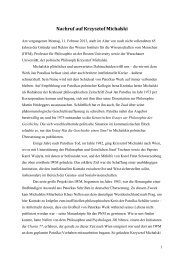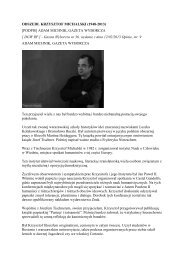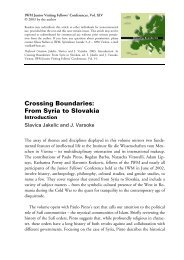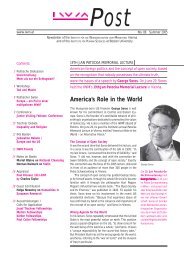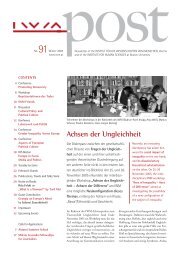Power, Subject and the Concept of Rational Action - IWM
Power, Subject and the Concept of Rational Action - IWM
Power, Subject and the Concept of Rational Action - IWM
You also want an ePaper? Increase the reach of your titles
YUMPU automatically turns print PDFs into web optimized ePapers that Google loves.
<strong>IWM</strong> Junior Visiting Fellows Conferences, Vol. VIII/6<br />
© 1999 by <strong>the</strong> author<br />
Readers may redistribute this article to o<strong>the</strong>r individuals for noncommercial use,<br />
provided that <strong>the</strong> text <strong>and</strong> this note remain intact. This article may not be reprinted<br />
or redistributed for commercial use without prior written permission from <strong>the</strong><br />
author. If you have any questions about permissions, please contact Klaus Nellen at<br />
<strong>IWM</strong>, Spittelauer Laende 3, A - 1090 Vienna, Fax +(431) 31358-30, e-mail<br />
.<br />
Preferred Citation: Wrobel, Szymon. <strong>Power</strong>, <strong>Subject</strong> <strong>and</strong> <strong>the</strong> <strong>Concept</strong> <strong>of</strong> <strong>Rational</strong><br />
<strong>Action</strong>, in: A Decade <strong>of</strong> Transformation, <strong>IWM</strong> Junior Visiting Fellows Conferences,<br />
Vol. 8: Vienna 1999<br />
<strong>Power</strong>, <strong>Subject</strong> <strong>and</strong> <strong>the</strong> <strong>Concept</strong><br />
<strong>of</strong> <strong>Rational</strong> <strong>Action</strong><br />
Szymon Wrobel<br />
When I have found an interesting flower or herb I try to figure out how it<br />
will fit toge<strong>the</strong>r with o<strong>the</strong>rs, whe<strong>the</strong>r it can create a bouquet or pattern.<br />
This is constructive puzzle-work.<br />
Jürgen Habermas<br />
The author is <strong>the</strong> principle <strong>of</strong> thrift in <strong>the</strong> proliferation <strong>of</strong> meaning…The<br />
author is <strong>the</strong>refore <strong>the</strong> ideological figure by which one marks <strong>the</strong> manner<br />
in which we fear <strong>the</strong> proliferation <strong>of</strong> meaning.<br />
Michel Foucault<br />
1.The concept <strong>of</strong> <strong>Rational</strong> <strong>Action</strong> in <strong>the</strong> Enlightenment Tradition -<br />
An Attempt <strong>of</strong> Explication<br />
1.1. Primal Story<br />
The rationality <strong>of</strong> beliefs <strong>and</strong> actions is naturally a timeless topic <strong>of</strong> philosophical<br />
investigations. "One could even say that philosophical thought originates in reflection<br />
on <strong>the</strong> reason embodied in cognition, speech, <strong>and</strong> action; <strong>and</strong> reason remains
SZYMON WROBEL: POWER, SUBJECT AND THE CONCEPT OF RATIONAL ACTION 2<br />
its basic <strong>the</strong>me." 1 In <strong>the</strong> Enlightenment tradition, rationality is typically seen as a<br />
concept that is well defined <strong>and</strong> context-independent. 2 We know what rationality<br />
is, <strong>and</strong> rationality is supposed to be constant over time <strong>and</strong> place. Philosophy in<br />
this tradition <strong>of</strong>ten presents rationality as independent <strong>of</strong> social, cultural <strong>and</strong><br />
historical context, especially in universal philosophical, ethical or scientific<br />
imperatives. If <strong>the</strong>se imperatives are followed, <strong>the</strong> result is supposed to be rational<br />
<strong>and</strong> generally acceptable actions. For example, in <strong>the</strong> field <strong>of</strong> science we could find<br />
such an imperative like this that is typical for <strong>the</strong> empiricist point <strong>of</strong> view: if you<br />
want to be a good empiricist you must be prepared to work with only one <strong>the</strong>ory<br />
(i.e., with a single point <strong>of</strong> view <strong>and</strong> "experience"). In o<strong>the</strong>r words, all <strong>the</strong>oretical<br />
predicates should be translatable into observational predicates. It is also supposed<br />
that <strong>the</strong>re are simple forms <strong>of</strong> inference, which all rational persons find<br />
compelling. 3 Similarly on <strong>the</strong> moral ground, Immanuel Kant tells us that a good<br />
action toward ano<strong>the</strong>r person does not count as a moral action unless <strong>the</strong> person is<br />
thought <strong>of</strong> as a rational being ra<strong>the</strong>r than as a relative, a neighbor or a fellow<br />
citizen. So, Kant saw respect for "reason," <strong>the</strong> common core <strong>of</strong> humanity, as <strong>the</strong><br />
only motive which justifies <strong>the</strong> moral sense. 4<br />
But what does it mean exactly to say that persons behave "rationally" in a certain<br />
situation or that <strong>the</strong>ir expressions can count as "rational?" The question is important<br />
because we <strong>of</strong>ten tend to reach for a characterization <strong>of</strong> <strong>the</strong> concept <strong>of</strong> rationality<br />
merely in formal terms. Can rationality be seen only as logical consistency? And<br />
in this sense can someone who acts in violation <strong>of</strong> her own interests be considered<br />
irrational? In this way <strong>of</strong> questioning, I would like to touch not only on <strong>the</strong> foundational<br />
issues <strong>of</strong> how <strong>the</strong> social sciences should proceed, but also on <strong>the</strong> much<br />
more troublesome issue <strong>of</strong> how we, as men <strong>and</strong> women, should properly<br />
underst<strong>and</strong> ourselves.<br />
1 Habermas (1984: 2).<br />
2 The "Enlightenment tradition" is understood here as <strong>the</strong> modernity tradition from <strong>the</strong><br />
Reformation as manifested in efforts to streng<strong>the</strong>n <strong>the</strong> domains <strong>of</strong> cognitive rationality,<br />
moral autonomy, <strong>and</strong> social <strong>and</strong> political self-determination.<br />
3 Lukes (1984: 195-213); Lukes (1982: 261-305).<br />
4 Strictly speaking, according to Kant, a human action is moral not because is done from<br />
immediate inclination - <strong>the</strong> reason <strong>of</strong> this action lies in self-interest - but because it is done<br />
for <strong>the</strong> sake <strong>of</strong> duty. However, an action done from duty has its moral worth not from <strong>the</strong><br />
results it seeks to attain, but from formal principles or maxims. Kant (1993: 54-135); Paton<br />
(1993: 13-49); Deleuse (1984: 28-45); Rorty (1989: 191-196).
SZYMON WROBEL: POWER, SUBJECT AND THE CONCEPT OF RATIONAL ACTION 3<br />
I am going to argue that rationality is a context-dependent concept <strong>and</strong> that <strong>the</strong><br />
context <strong>of</strong> rationality is simply power. This is my basic <strong>the</strong>sis - that power not only<br />
blurs <strong>the</strong> dividing line between rationality <strong>and</strong> rationalization, but more power<br />
establishes <strong>the</strong> essential limits <strong>of</strong> <strong>the</strong> expression <strong>of</strong> one’s rationality.<br />
Let me repeat <strong>the</strong> question: What does it mean to say that a person behaves<br />
rationally? Here is <strong>the</strong> typical story one <strong>of</strong>ten sees in this context: 5 An agent (some<br />
person) finds herself in a certain situation S <strong>and</strong> believes that a certain set <strong>of</strong> behavioral<br />
options is available to her in this situation. The set <strong>of</strong> behavioral options is <strong>the</strong><br />
set <strong>of</strong> actions <strong>the</strong> agent believes that she can do. In <strong>the</strong> next step, <strong>the</strong> probable consequences<br />
<strong>of</strong> performing each action (behavioral options) are predicted; i.e., an<br />
agent computes a set <strong>of</strong> hypo<strong>the</strong>ses <strong>of</strong> roughly <strong>the</strong> form: if action A is performed in<br />
situation S, <strong>the</strong>n, with a certain probability, one may expect a consequence Q. Subsequently,<br />
a preference ordering is assigned to <strong>the</strong> consequences. In sum we have<br />
<strong>the</strong> result: <strong>the</strong> person’s choice <strong>of</strong> action is determined as a function <strong>of</strong> <strong>the</strong> preferences<br />
<strong>and</strong> <strong>the</strong> probabilities assigned. Briefly <strong>the</strong>n, an agent chooses <strong>and</strong> produces<br />
behavior which would probably lead to a highly valued consequence for her. In<br />
o<strong>the</strong>r words, who wills <strong>the</strong> end wills <strong>the</strong> means.<br />
Yet <strong>the</strong>re is a problem here. The problem lies with <strong>the</strong> normativism <strong>of</strong> this<br />
model. We do not always contemplate each (or indeed any) <strong>of</strong> <strong>the</strong> behavioral<br />
options we believe to be available to us in a given situation. Nor do we always assess<br />
our options in light <strong>of</strong> what we take to be <strong>the</strong>ir likely consequences. Existentialists,<br />
like Jean-Paul Sartre, make a point <strong>of</strong> never doing so. 6<br />
Fur<strong>the</strong>rmore, <strong>the</strong> model presupposes a completely free will <strong>of</strong> a person. According<br />
to <strong>the</strong> model, an agent has unconstrained freedom <strong>of</strong> will, which among o<strong>the</strong>rs<br />
explains <strong>the</strong> possibility <strong>of</strong> error. Thanks to <strong>the</strong> will, a person is able to control her<br />
effects <strong>and</strong> her behavior in an absolute way. "Freedom," in this <strong>the</strong>oretical context,<br />
means <strong>the</strong> possibility <strong>of</strong> making different choices.<br />
5 For a more precise explication <strong>of</strong> <strong>the</strong> concept <strong>of</strong> rationality in terms <strong>of</strong> computational <strong>the</strong>ory<br />
<strong>of</strong> mind, see Fodor (1976: 21-26).<br />
6 Sartre (1956).
SZYMON WROBEL: POWER, SUBJECT AND THE CONCEPT OF RATIONAL ACTION 4<br />
1.2. The Idea <strong>of</strong> Enlightenment<br />
This point is entirely in harmony with <strong>the</strong> fundamental idea <strong>of</strong> Immanuel Kant’s<br />
concept <strong>of</strong> Enlightenment. Being an adult person is equal with being <strong>the</strong> Master <strong>of</strong><br />
<strong>the</strong> Self. Enlightenment, according to Kant, is "... man’s emergence from his selfincurred<br />
immaturity. Immaturity is <strong>the</strong> inability to use one’s underst<strong>and</strong>ing<br />
without <strong>the</strong> guidance <strong>of</strong> ano<strong>the</strong>r person…Have <strong>the</strong> courage to use your own<br />
underst<strong>and</strong>ing! is thus <strong>the</strong> motto <strong>of</strong> enlightenment." 7 "Underst<strong>and</strong>ing without <strong>the</strong><br />
guidance <strong>of</strong> ano<strong>the</strong>r person" means "guided by reason." "Ano<strong>the</strong>r person" is, in <strong>the</strong><br />
life cycle, replaced by "reason." Every adult person ought to make her own<br />
decisions <strong>and</strong> take full responsibility for <strong>the</strong>m since when achieving a kind <strong>of</strong><br />
maturity at some point <strong>of</strong> her life, she also achieves a sense <strong>of</strong> an inner locus <strong>of</strong><br />
control.<br />
But <strong>the</strong> paradox is that in this <strong>the</strong>oretical context self-control is only a consequence<br />
<strong>of</strong> <strong>the</strong> fact that society at first established its own control - <strong>the</strong> control <strong>of</strong><br />
someone else over me. The power someone else has over me is <strong>the</strong> basic condition<br />
<strong>and</strong> premise <strong>of</strong> <strong>the</strong> establishment <strong>of</strong> power <strong>of</strong> me over myself. The very sense <strong>of</strong><br />
autonomy, as in an individual as in a social development, comes later than <strong>the</strong> sense<br />
<strong>of</strong> heteronomy. Similarly, <strong>the</strong> sense <strong>of</strong> <strong>the</strong> external locus <strong>of</strong> control comes earlier than<br />
<strong>the</strong> sense <strong>of</strong> <strong>the</strong> inner locus <strong>of</strong> control.<br />
From Nature’s point <strong>of</strong> view, I stopped being a child when I became able to have<br />
children, but from Culture’s perspective I am still a child since I have no job <strong>and</strong><br />
still have a lot to learn. By "immaturity," Kant means a certain state <strong>of</strong> our will. We<br />
are in <strong>the</strong> state <strong>of</strong> "immaturity" when, for example, a book takes <strong>the</strong> place <strong>of</strong> our<br />
underst<strong>and</strong>ing, when a spiritual director takes <strong>the</strong> place <strong>of</strong> our conscience, <strong>and</strong> even<br />
when a doctor decides for us what our diet should be. At <strong>the</strong> moment, I am eager<br />
to ask: Do we establish so much discipline in society that we do not yet need more<br />
external authority which would be obligated to control <strong>and</strong> examine <strong>the</strong> moral<br />
sense <strong>of</strong> our actions?<br />
Because for Kant, <strong>the</strong> Enlightenment is not a world era to which one belongs,<br />
but ra<strong>the</strong>r is a process, a task <strong>and</strong> an obligation that releases us from immaturity -<br />
an immature status for which man himself is responsible. The Enlightenment<br />
means achieving mature responsibility; it is <strong>the</strong> moment when humanity is going to<br />
put its own reason to use without subjecting itself to any authority. But <strong>the</strong> concept<br />
<strong>of</strong> authority is important because it also generates fur<strong>the</strong>r puzzlement.<br />
7 Kant (1996: 58).
SZYMON WROBEL: POWER, SUBJECT AND THE CONCEPT OF RATIONAL ACTION 5<br />
1.3. The <strong>Concept</strong> <strong>of</strong> <strong>Power</strong><br />
Of course, I realize that <strong>the</strong> concept <strong>of</strong> power is one <strong>of</strong> those concepts that is<br />
unavoidably value-dependent <strong>and</strong> even more essentially contested. <strong>Power</strong> might<br />
well be an instance <strong>of</strong> what Ludwig Wittgenstein famously termed a "family-resemblance<br />
concept" - a loose grouping <strong>of</strong> individuals, each characterized by one or<br />
ano<strong>the</strong>r set <strong>of</strong> overlapping features or similarities, no one <strong>of</strong> which pervades <strong>the</strong>m<br />
all. 8 Moreover, every definition <strong>of</strong> a concept <strong>of</strong> power also is inextricably tied to a<br />
given set <strong>of</strong> value-assumptions which predetermine <strong>the</strong> range <strong>of</strong> its empirical application.<br />
But as <strong>the</strong> point <strong>of</strong> departure we may take for our purpose perhaps <strong>the</strong> most<br />
simple so-called intuitive concept <strong>of</strong> power, which was inter alia described by Robert<br />
Dahl. According to this concept, A (i.e., a person or a group <strong>of</strong> persons) has power<br />
over B (i.e., ano<strong>the</strong>r person or o<strong>the</strong>r group <strong>of</strong> persons) to <strong>the</strong> extent that she causes<br />
B to do something that B would not o<strong>the</strong>rwise do. In o<strong>the</strong>r words, in this <strong>the</strong>oretical<br />
context <strong>the</strong> concept <strong>of</strong> power refers to all forms <strong>of</strong> control by A over B. In <strong>the</strong><br />
simplest interpretation, A exercises power over B when A affects B in a manner<br />
contrary to B`s interests. 9<br />
In this way we are able to define ano<strong>the</strong>r set <strong>of</strong> concepts connected with power. 10<br />
For <strong>the</strong> extension <strong>of</strong> <strong>the</strong> concept <strong>of</strong> power is very vast; it embraces coercion, influence,<br />
authority, force <strong>and</strong> manipulation. Coercion, for example, exists where A<br />
affects B’s compliance by threatening deprivation or o<strong>the</strong>r unpleasant sanctions.<br />
Influence exists where A, without resorting to ei<strong>the</strong>r a tacit or an overt threat <strong>of</strong> deprivation<br />
causes B to change her course <strong>of</strong> action. An example <strong>of</strong> <strong>the</strong> case <strong>of</strong><br />
influence is, perhaps, authority. In a situation involving authority, B subjects A<br />
because she recognizes that A’s comm<strong>and</strong> is reasonable in terms <strong>of</strong> her own values<br />
or because its content is legitimate. The power <strong>of</strong> A over B is, in legitimized form,<br />
<strong>the</strong> "right" <strong>of</strong> A, as a decision-making unit involved in a collective process. These<br />
decisions are made, <strong>of</strong> course, in <strong>the</strong> interest <strong>of</strong> <strong>the</strong> effectiveness <strong>of</strong> <strong>the</strong> collective as<br />
a whole. In <strong>the</strong> case <strong>of</strong> force, A achieves her aims by stripping B from <strong>the</strong> preference<br />
order <strong>and</strong> free will. "Naked" force (i.e., violence) in this sense is <strong>the</strong> "top" boundary<br />
<strong>of</strong> power. The simple example <strong>of</strong> this case is tyranny. The "naked" freedom,<br />
however, perhaps is <strong>the</strong> bottom boundary <strong>of</strong> power; pure anarchy is <strong>the</strong> simple<br />
example <strong>of</strong> this case. Democracy in this architectural order is in <strong>the</strong> middle. Its<br />
8 Wittgenstein (1958: 43).<br />
9 Dahl (1957: 201-205).<br />
10 Lukes (1984: 17-20).
SZYMON WROBEL: POWER, SUBJECT AND THE CONCEPT OF RATIONAL ACTION 6<br />
basic feature is a kind <strong>of</strong> equilibrium between power <strong>and</strong> freedom. For power is<br />
exercised only over a free subject because "to govern" means "to structure" one’s<br />
order or preference. Maybe this is <strong>the</strong> reason why Hannah Arendt wrote that<br />
"violence can always destroy power" <strong>and</strong> "power <strong>and</strong> violence are opposites." 11<br />
1.4. The Paradox <strong>of</strong> <strong>Rational</strong>ity <strong>and</strong> <strong>Power</strong><br />
Now that we have been acquainted <strong>and</strong> prepared, we again may come back to our<br />
primal problem, <strong>and</strong>, chiefly, to deliberate our paradox in o<strong>the</strong>r ways. The concept<br />
<strong>of</strong> acting, in which one realizes <strong>the</strong> will <strong>of</strong> someone else, is involved in some important<br />
paradox in <strong>the</strong> significant antinomy. On <strong>the</strong> one h<strong>and</strong>, <strong>the</strong> act <strong>of</strong> fulfilling <strong>the</strong><br />
o<strong>the</strong>r’s comm<strong>and</strong> is a kind <strong>of</strong> intentional action. Most people yield to public<br />
authority not from fear <strong>of</strong> punishment or in hope <strong>of</strong> a compensatory reward, but<br />
because <strong>the</strong>y are law-abiding citizens. There is a great number <strong>of</strong> such situations in<br />
which submission comes because <strong>the</strong> individual believes or has been persuaded that<br />
this is somehow <strong>the</strong> better course for her. It is a submission that derives from belief.<br />
<strong>Power</strong>, as Bertr<strong>and</strong> Russell many years ago observed, is derived to some extent from<br />
prepositional attitudes. Armies are useless unless <strong>the</strong> soldiers believe in <strong>the</strong> cause for<br />
which <strong>the</strong>y are fighting. Law is impotent unless it is generally respected. Economic<br />
institutions depend upon respect <strong>of</strong> <strong>the</strong> law. 12<br />
But, on <strong>the</strong> o<strong>the</strong>r h<strong>and</strong>, as we know, acting intentionally means acting according<br />
to one’s own plan or program. Being rational is being intentional. 13 It means that<br />
one is able to design one’s behavior. But when one submits to <strong>the</strong> power <strong>of</strong> someone<br />
else, performing ano<strong>the</strong>r person’s comm<strong>and</strong>, <strong>the</strong>n one’s activity seems to be<br />
designed by <strong>the</strong> o<strong>the</strong>r person <strong>and</strong> not by herself. However, someone who acts in<br />
violation <strong>of</strong> her own interests can be considered irrational. Thus, does <strong>the</strong> act <strong>of</strong><br />
submission indeed reveal <strong>the</strong> will <strong>and</strong> intention <strong>of</strong> an acting agent? Is submission to<br />
authority compatible with <strong>the</strong> exercise <strong>of</strong> reason? Is authority by definition legiti-<br />
11 Arendt (1970: 44-56).<br />
12 Russell (1938: 136).<br />
13 I recall Dennett’s intentional-system <strong>the</strong>ory which depends upon what he calls "stances."<br />
Stances are strategies that one may adopt to predict <strong>the</strong> behavior <strong>of</strong> a person or machine.<br />
From <strong>the</strong> physical stance, objects are described <strong>and</strong> <strong>the</strong>ir behavior predicted on <strong>the</strong> basis <strong>of</strong><br />
physical constitution. From <strong>the</strong> design stance, objects are described <strong>and</strong> <strong>the</strong>ir behavior<br />
predicted in terms <strong>of</strong> normal operation or function. From <strong>the</strong> intentional stance, objects are<br />
described <strong>and</strong> <strong>the</strong>ir behavior predicted by attributing rationality to <strong>the</strong>m - that is, by<br />
ascribing to <strong>the</strong>m a system <strong>of</strong> <strong>the</strong> possession <strong>of</strong> certain information <strong>and</strong> supposing it to be<br />
directed by certain goals. From <strong>the</strong> intentional stance, one can assume that <strong>the</strong> agent will<br />
select an optimal strategy to reach his or her or its goals. Dennett (1983: 384-390).
SZYMON WROBEL: POWER, SUBJECT AND THE CONCEPT OF RATIONAL ACTION 7<br />
mate? And is it by definition consensual? In o<strong>the</strong>r words, an agent, while submitted<br />
to someone else’s will, produces behavior that would probably lead to a highly valued<br />
consequence not for her but for her comm<strong>and</strong>er. In this case, one may have<br />
some doubts whe<strong>the</strong>r such behavior is rational in <strong>the</strong> above-mentioned concept <strong>of</strong><br />
rationality.<br />
Perhaps this antinomy is <strong>the</strong> central question <strong>of</strong> all political philosophy since it<br />
concerns <strong>the</strong> nature <strong>of</strong> <strong>the</strong> authority <strong>of</strong> <strong>the</strong> state. As Peter Winch showed, <strong>the</strong> concept<br />
<strong>of</strong> such authority is similar to <strong>the</strong> above-mentioned philosophical puzzle. On<br />
<strong>the</strong> one h<strong>and</strong>, it seems to involve a power "to kill" (or better "to override") <strong>the</strong> will<br />
<strong>of</strong> <strong>the</strong> individual citizen. While on <strong>the</strong> o<strong>the</strong>r h<strong>and</strong>, <strong>the</strong> existence <strong>of</strong> power in a certain<br />
sense seems to depend on <strong>the</strong> wills <strong>of</strong> <strong>the</strong> individuals who are subject to it. For<br />
<strong>the</strong>y can decide whe<strong>the</strong>r or not to acknowledge it as legitimate. Where <strong>the</strong>re is not<br />
such an acknowledgement, one feels hesitant in saying that one is dealing with an<br />
instance <strong>of</strong> political authority at all. 14<br />
In my opinion <strong>the</strong>re exist only two different kinds <strong>of</strong> philosophical reactions to<br />
this paradox. The first reaction, which may be called anarchical, makes an assumption<br />
that <strong>the</strong> approbation <strong>of</strong> power is an irrational act since power is <strong>the</strong> possibility<br />
<strong>of</strong> imposing one’s will upon <strong>the</strong> behavior <strong>of</strong> o<strong>the</strong>r persons. 15 Consequently, power<br />
is also <strong>the</strong> ability <strong>of</strong> imposing one’s preference order, which is <strong>the</strong> essence <strong>and</strong> <strong>the</strong><br />
guarantee <strong>of</strong> individual rationality.<br />
The second treatment <strong>of</strong> power, which may be called legitimise, makes an<br />
assumption that <strong>the</strong> approbation <strong>of</strong> power may be (<strong>and</strong> indeed <strong>of</strong>ten is) a part <strong>of</strong><br />
wider rationality (i.e., power may be understood as a means <strong>of</strong> <strong>the</strong> achievement <strong>of</strong><br />
some oversingular social good). And in this context one may, or ra<strong>the</strong>r even must,<br />
sometimes renounce her own rationality (i.e. preference order) to realize <strong>the</strong> very<br />
idea <strong>of</strong> social rationality. Indeed, when power, as seen here, requires <strong>the</strong> prior consent<br />
<strong>of</strong> those over whom it is exercised, <strong>the</strong>n it will also be recognized that power<br />
can never be exercised by means <strong>of</strong> <strong>the</strong> use <strong>of</strong> violence.<br />
14 Winch (1972: 90-109).<br />
15 Max Weber, while deeply fascinated by <strong>the</strong> complexity <strong>of</strong> <strong>the</strong> subject <strong>of</strong> power, contented<br />
himself with <strong>the</strong> definition close to everyday underst<strong>and</strong>ing, which I use here. Bendix (1960:<br />
294-300).
SZYMON WROBEL: POWER, SUBJECT AND THE CONCEPT OF RATIONAL ACTION 8<br />
1.5. Searching for Solutions<br />
In <strong>the</strong> next step I will argue that Michel Foucault’s <strong>and</strong> Jürgen Habermas’s dispute<br />
about <strong>the</strong> normative distinctions between <strong>the</strong> legitimate <strong>and</strong> illegitimate uses <strong>of</strong><br />
power resulted from different "solutions" to this paradox <strong>of</strong> "rationality <strong>and</strong> power"<br />
as well as from different treatments <strong>of</strong> <strong>the</strong> very concept <strong>of</strong> <strong>the</strong> Enlightenment. 16<br />
Foucault’s point <strong>of</strong> view is closer to <strong>the</strong> anarchical "solution" <strong>of</strong> this paradox (as I<br />
shall call <strong>the</strong> point <strong>of</strong> view which believes in <strong>the</strong> concept <strong>of</strong> individual rationality<br />
against <strong>the</strong> concept <strong>of</strong> <strong>the</strong> oversingular social rationality). He also stresses <strong>the</strong> idea<br />
<strong>of</strong> <strong>the</strong> autonomy <strong>of</strong> <strong>the</strong> Enlightenment tradition in that he expects modern man not<br />
to discover himself, his secrets <strong>and</strong> his hidden truth, but ra<strong>the</strong>r try to invent<br />
himself. From this point <strong>of</strong> view, <strong>the</strong> Enlightenment does not liberate man in his<br />
own being; ra<strong>the</strong>r it compels him to face <strong>the</strong> task <strong>of</strong> producing himself. 17<br />
Habermas, in contradistinction to Foucault, is closer to <strong>the</strong> legitimate "solution"<br />
<strong>of</strong> <strong>the</strong> paradox <strong>of</strong> <strong>the</strong> "rationality <strong>and</strong> power" (as I shall call <strong>the</strong> point <strong>of</strong> view that<br />
assumes that coherence <strong>of</strong> society is <strong>the</strong> consequence <strong>of</strong> consensus omnium) <strong>and</strong><br />
maintains that only responsible persons can behave rationally.<br />
I have chosen <strong>the</strong>se two philosophers not incidentally since I think <strong>the</strong>y represent<br />
in very spectacular ways two views, or perhaps even two schools <strong>of</strong> thought <strong>of</strong><br />
Western political society. Both <strong>the</strong>se views are intended to explain what has been,<br />
<strong>and</strong>, I am afraid, what will continue to be <strong>the</strong> most puzzling problem <strong>of</strong> social<br />
philosophy - how it is that human societies cohere. 18<br />
In my opinion, Habermas develops a school <strong>of</strong> thought according to which<br />
social order results from a general agreement <strong>of</strong> values, a consensus omnium which<br />
outweighs all possible or actual differences <strong>of</strong> opinion <strong>and</strong> interest. Foucault, in<br />
contradistinction to Habermas, develops ano<strong>the</strong>r school <strong>of</strong> thought which holds<br />
16 A formal debate between Foucault <strong>and</strong> Habermas never took place. Some Americans<br />
proposed a conference in <strong>the</strong> early 1980s to allow <strong>the</strong>m to air <strong>the</strong>ir differences in <strong>the</strong> public<br />
sphere. One major reason why nei<strong>the</strong>r event materialized was, <strong>of</strong> course, Foucault’s death.<br />
But <strong>the</strong> more philosophical reason was that <strong>the</strong> two thinkers could not agree on <strong>the</strong> topic for<br />
<strong>the</strong> conference which would have set stage for <strong>the</strong>ir debate. According to Foucault, <strong>the</strong><br />
Americans suggested a conference on <strong>the</strong> topic <strong>of</strong> modernity. But he claimed not to<br />
underst<strong>and</strong> what problems modernity represented. He saw himself as a modernist, where<br />
modernism is understood as more <strong>of</strong> an attitude than a historical period. Habermas has a<br />
different account, saying that Foucault would argue that modernity should be ab<strong>and</strong>oned<br />
ra<strong>the</strong>r than competed. Kelly (1994 B: 2-3).<br />
17 Foucault (1984 c: 32-50).<br />
18 For an <strong>of</strong>fering <strong>of</strong> some interesting <strong>and</strong> important answers to this question, see Dahrendorf<br />
(1959: 158-240), Dahrendorf (1990: 25-34).
SZYMON WROBEL: POWER, SUBJECT AND THE CONCEPT OF RATIONAL ACTION 9<br />
that <strong>the</strong> coherence <strong>and</strong> order in society are founded on force <strong>and</strong> constraint, on <strong>the</strong><br />
domination <strong>of</strong> some <strong>and</strong> <strong>the</strong> subjection <strong>of</strong> o<strong>the</strong>rs. According to <strong>the</strong> first school,<br />
society in some sense <strong>and</strong> to some extent is a kind <strong>of</strong> contract <strong>of</strong> cooperation,<br />
meaning that every functioning social structure is based on a consensus <strong>of</strong> values<br />
among its members. According to <strong>the</strong> second school, society is in some sense <strong>and</strong> to<br />
some extent a kind <strong>of</strong> contract <strong>of</strong> domination, meaning that every society is based on<br />
<strong>the</strong> coercion <strong>of</strong> some <strong>of</strong> its members by o<strong>the</strong>rs.<br />
The principle distinction between Habermas <strong>and</strong> Foucault lies in <strong>the</strong> answer to<br />
<strong>the</strong> following question: Are <strong>the</strong>re social norms claiming legitimacy which are genuinely<br />
accepted by those who follow <strong>and</strong> internalize <strong>the</strong>m or do <strong>the</strong>y merely stabilize<br />
<strong>the</strong> relations <strong>of</strong> power? Habermas tells us that <strong>the</strong>re are such norms that are (<strong>and</strong><br />
even should be) genuinely accepted. Foucault, on <strong>the</strong> contrary, demonstrates that<br />
such a set <strong>of</strong> values merely stabilizes <strong>the</strong> relations <strong>of</strong> power.<br />
2. Jürgen Habermas’s Point <strong>of</strong> View (The Side <strong>of</strong> <strong>the</strong> Contract <strong>of</strong><br />
Cooperation)<br />
2.1. First Differentiations<br />
The idea <strong>of</strong> cognitive-instrumental rationality, from Habermas’s point <strong>of</strong> view, is <strong>the</strong><br />
simple consequence <strong>of</strong> an atomistic perspective <strong>of</strong> thought, according to which <strong>the</strong><br />
subject st<strong>and</strong>s over <strong>and</strong> against a world <strong>of</strong> objects to which it has two basic relations:<br />
representation <strong>and</strong> action. The concept <strong>of</strong> purposeful-rational action is based on<br />
<strong>the</strong> assumption that <strong>the</strong> subject is capable <strong>of</strong> gaining knowledge about an<br />
environment <strong>and</strong> putting it to effective use in intelligently adapting <strong>and</strong><br />
manipulating that environment. So, <strong>the</strong> cognitivist version <strong>of</strong> rationality asserts that<br />
goal-directed actions can be rational only if <strong>the</strong> actor satisfies <strong>the</strong> conditions<br />
necessary for realizing her intention to intervene successfully in <strong>the</strong> world. In this<br />
model rational actions basically have <strong>the</strong> character <strong>of</strong> goal-directed, feedbackcontrolled<br />
interventions in <strong>the</strong> world <strong>of</strong> existing states <strong>of</strong> affairs.<br />
Habermas reckons that <strong>the</strong> concept <strong>of</strong> cognitive-instrumental rationality can (or<br />
ra<strong>the</strong>r should) fit into <strong>the</strong> more comprehensive concept <strong>of</strong> communicative rationality.<br />
If <strong>the</strong> rationality <strong>of</strong> one’s person is measured by <strong>the</strong> success <strong>of</strong> goal-directed interventions,<br />
it suffices to require that a person be able to choose among alternatives<br />
<strong>and</strong> control some conditions in her environment. But if rationality is measured by<br />
whe<strong>the</strong>r <strong>the</strong> processes <strong>of</strong> reaching underst<strong>and</strong>ing are successful, such capacities do<br />
not suffice.
SZYMON WROBEL: POWER, SUBJECT AND THE CONCEPT OF RATIONAL ACTION 10<br />
In this context it is also clear why Habermas is eager to shift to <strong>the</strong> paradigm <strong>of</strong><br />
language - but not language as a syntactic or semantic system or engine, but "language-in-use."<br />
According to Habermas, <strong>the</strong> human species maintains itself through<br />
<strong>the</strong> socially coordinated activities <strong>of</strong> its members, <strong>and</strong> this coordination is established<br />
through communication. From this premise Habermas moves to <strong>the</strong> conclusion<br />
that <strong>the</strong> reproduction <strong>the</strong> species requires satisfying <strong>the</strong> conditions <strong>of</strong> rationality<br />
inherent in communicative action. Language is a means <strong>of</strong> communication<br />
which serves mutual underst<strong>and</strong>ing, whereas actors, in coming to an underst<strong>and</strong>ing<br />
with one ano<strong>the</strong>r so as to coordinate <strong>the</strong>ir actions, pursue <strong>the</strong>ir particular aims.<br />
Hence <strong>the</strong> problem <strong>of</strong> how communication in general is possible.<br />
2.2. The Idea <strong>of</strong> Successful Communication<br />
Communication is successful only when <strong>the</strong> hearer infers <strong>the</strong> speaker's intentions<br />
from <strong>the</strong> character <strong>of</strong> <strong>the</strong> utterance she produces. Therefore, communication<br />
between speaker <strong>and</strong> hearer requires that <strong>the</strong> hearer should be able to infer what <strong>the</strong><br />
speaker believes from what she says. When <strong>the</strong> speaker's beliefs are true, <strong>the</strong> hearer<br />
will also be able to infer how <strong>the</strong> world is from what <strong>the</strong> speaker says. Someone uses<br />
her language coherently when <strong>the</strong>re is certain correspondence between what she<br />
believes <strong>and</strong> <strong>the</strong> form <strong>of</strong> words she uses to express her beliefs. In <strong>the</strong> case <strong>of</strong> public<br />
languages this correspondence holds true because <strong>the</strong> speaker knows <strong>and</strong> adheres to<br />
<strong>the</strong> conventions that govern language. Such conventions fundamentally are <strong>the</strong><br />
rules which pair prepositional attitudes, such as beliefs, with <strong>the</strong> forms <strong>of</strong> words<br />
that express those attitudes.<br />
Language, according to Habermas, is <strong>the</strong> medium <strong>of</strong> <strong>the</strong> socialization process.<br />
There are two basic moments <strong>of</strong> <strong>the</strong> movement <strong>of</strong> <strong>the</strong> development <strong>of</strong> <strong>Subject</strong> -<br />
individualisation <strong>and</strong> universalization, subjective freedom <strong>and</strong> rational community -<br />
that Habermas wants to integrate in one medium (i.e., in <strong>the</strong> language). 19 Habermas<br />
makes <strong>the</strong> same move as George Herbert Mead in Mind, Self <strong>and</strong> Society when<br />
he tries to construe reason as <strong>the</strong> internalization <strong>of</strong> <strong>the</strong> social norm ra<strong>the</strong>r than as a<br />
built-in component <strong>of</strong> <strong>the</strong> human self. 20<br />
As <strong>the</strong> author <strong>of</strong> Die Einbeziehung des Anderes, Habermas seeks to defend <strong>the</strong><br />
values <strong>of</strong> <strong>the</strong> Enlightenment by replacing <strong>the</strong> "philosophy <strong>of</strong> subjectivity" with a<br />
19 Habermas’s reflections always point to <strong>the</strong> <strong>the</strong>sis that "<strong>the</strong> unity <strong>of</strong> reason only remains<br />
perceptible in <strong>the</strong> plurality <strong>of</strong> its voices - as <strong>the</strong> possibility in principle <strong>of</strong> passing from<br />
language into ano<strong>the</strong>r..." Habermas (1992: 117).<br />
20 Mead (1965).
SZYMON WROBEL: POWER, SUBJECT AND THE CONCEPT OF RATIONAL ACTION 11<br />
"philosophy <strong>of</strong> intersubjectivity" - by replacing <strong>the</strong> old traditional "subject-centred<br />
conception <strong>of</strong> ‘reason’" with what he calls "communicative reason;" he thinks that<br />
<strong>the</strong> lack <strong>of</strong> sense <strong>of</strong> rationality as social rationality was <strong>the</strong> basic lack <strong>of</strong> <strong>the</strong> philosophy<br />
<strong>of</strong> <strong>the</strong> subject. 21 So, Habermas has sought to examine how language brings us<br />
toge<strong>the</strong>r into a community with o<strong>the</strong>rs. "Our first sentence," he wrote in Knowledge<br />
<strong>and</strong> Human Interests, "expresses unequivocally <strong>the</strong> intention <strong>of</strong> universal <strong>and</strong><br />
unconstrained consensus." 22 In <strong>the</strong> act <strong>of</strong> speaking, we enter into an implicit <strong>and</strong><br />
unavoidable contract with o<strong>the</strong>rs that commits us to clarifying, discussing <strong>and</strong><br />
reformulating what it is we have said. Our language is extraordinarily well stocked<br />
with devices for initiating fur<strong>the</strong>r discussion. For it works in <strong>the</strong> way it must<br />
implicitly contain within itself <strong>the</strong> promise <strong>of</strong> a community bound toge<strong>the</strong>r by<br />
mutual underst<strong>and</strong>ing <strong>and</strong> agreement.<br />
2.3. Argumentation<br />
The rationality inherent in <strong>the</strong> communication practice is seen in <strong>the</strong> fact that <strong>the</strong><br />
achieved agreement must be based on some reasons. A person whose behavior may<br />
be acknowledged as rational should provide reasons for her expressions. For this<br />
reason <strong>the</strong> concept <strong>of</strong> communicative rationality can be adequately explicated only<br />
in terms <strong>of</strong> a <strong>the</strong>ory <strong>of</strong> argumentation. On this point Habermas is inclined to claim<br />
that we call persons rational who can justify <strong>the</strong>ir actions, who are not "deaf to<br />
argument" <strong>and</strong> who are "open to argument." Argumentation already plays an<br />
important role in <strong>the</strong> learning process. A rational person should be able to learn<br />
from his mistakes, from <strong>the</strong> refutations <strong>of</strong> hypo<strong>the</strong>ses <strong>and</strong> from <strong>the</strong> failure <strong>of</strong> interventions.<br />
This point approaches Habermas’s <strong>the</strong>ory to <strong>the</strong> genetic epistemology <strong>of</strong> Jean<br />
Piaget. In <strong>the</strong> tradition <strong>of</strong> Piaget, cognitive development is conceptualized as <strong>the</strong><br />
internally reconstructable sequences <strong>of</strong> stages <strong>of</strong> competence. This is <strong>the</strong> process <strong>of</strong><br />
embodying rationality, which cannot be interpreted as a learning process in <strong>the</strong><br />
strict sense, but at last as an increase in adaptive capacities. Habermas is interested<br />
in <strong>the</strong> procedural concept <strong>of</strong> rationality, which can be worked out in terms <strong>of</strong> <strong>the</strong><br />
pragmatic logic <strong>of</strong> argumentation. "<strong>Rational</strong>ity" refers in <strong>the</strong> first instance to <strong>the</strong><br />
disposition <strong>of</strong> speaking <strong>and</strong> acting subjects to acquire <strong>and</strong> use fallible knowledge.<br />
Communicative reason is expressed in a decentered underst<strong>and</strong>ing <strong>of</strong> <strong>the</strong> world.<br />
Thus for Piaget, cognitive development signifies in general <strong>the</strong> decentration <strong>of</strong> an<br />
21 Habermas (1992: 149-204).<br />
22 Habermas (1971: 314).
SZYMON WROBEL: POWER, SUBJECT AND THE CONCEPT OF RATIONAL ACTION 12<br />
egocentric underst<strong>and</strong>ing <strong>of</strong> <strong>the</strong> world. Whereas contact with external nature,<br />
which is established through instrumental action, mediates <strong>the</strong> constructive<br />
acquisition <strong>of</strong> <strong>the</strong> system <strong>of</strong> intellectual norms, interaction with o<strong>the</strong>r persons opens<br />
<strong>the</strong> way for growing constructively into <strong>the</strong> socially recognized system <strong>of</strong> moral<br />
norms. Piaget draws a distinction between dealing with physical objects <strong>and</strong> dealing<br />
with social objects, that is a reciprocal action between a subject <strong>and</strong> objects <strong>and</strong><br />
reciprocal action between a subject <strong>and</strong> o<strong>the</strong>r subjects. 23<br />
Objections to this style <strong>of</strong> thinking have frequently been brought by thinkers in<br />
<strong>the</strong> hermeneutic tradition, most notably Hans-Georg Gadamer, who, in his important<br />
debate with Habermas in <strong>the</strong> 1960s, accused Habermas <strong>of</strong> being unconsciously<br />
guided by <strong>the</strong> image <strong>of</strong> an "anarchistic utopi" ins<strong>of</strong>ar as he believed it possible to<br />
submit all inherited authority to a dem<strong>and</strong> for rational justification. 24 For<br />
Gadamer, "It is not so much our judgements as it is our prejudices that constitute<br />
our being." 25 In o<strong>the</strong>r words, "tradition" reaches deeper than any possible explicitly<br />
attained consensus, even if <strong>the</strong> consensus rests on rational argumentation. According<br />
to this idea, history does not belong to us, but ra<strong>the</strong>r we belong to history.<br />
"Long before we underst<strong>and</strong> ourselves through <strong>the</strong> process <strong>of</strong> self-examination, we<br />
underst<strong>and</strong> ourselves in a self-evident way in <strong>the</strong> family, society <strong>and</strong> state in which<br />
we live." 26 Prejudices are <strong>the</strong> grounds <strong>of</strong> our knowledge; <strong>the</strong>y are only judgements<br />
made before all <strong>the</strong> elements <strong>of</strong> a situation have been ascertained. But Gadamer<br />
does not answer <strong>the</strong> question as to which way we could distinguish between blind<br />
prejudices <strong>and</strong> those which are justified, since both equally constitute our being.<br />
2.4. A Case <strong>of</strong> Distorted Communication<br />
In conditions <strong>of</strong> normal (undisturbed) communication, intelligibility (underst<strong>and</strong>ing)<br />
is guaranteed by <strong>the</strong> linguistic competence <strong>of</strong> <strong>the</strong> participants <strong>of</strong> interaction.<br />
Noam Chomsky <strong>the</strong>oretically reconstructed this competence. Starting from his<br />
own research, Chomsky asked: How is it that on <strong>the</strong> basis <strong>of</strong> a partial <strong>and</strong><br />
fragmentary set <strong>of</strong> experiences, individuals in every culture are able not only to<br />
learn <strong>the</strong>ir own language, but also to use it in a creative way? The creative aspect <strong>of</strong><br />
language use is <strong>the</strong> distinctively human ability to express new thoughts <strong>and</strong> to<br />
underst<strong>and</strong> entirely new expressions <strong>of</strong> thought within <strong>the</strong> framework <strong>of</strong> an<br />
23 Piaget (1930), Habermas (1984: 68-70).<br />
24 Gadamer (1976a: 42), How (1995).<br />
25 Ibid. p. 9.<br />
26 Gadamer (1989: 276-277).
SZYMON WROBEL: POWER, SUBJECT AND THE CONCEPT OF RATIONAL ACTION 13<br />
"instituted language." For Chomsky, <strong>the</strong>re was only one possible answer; <strong>the</strong>re<br />
must be a bio-physical structure underlying <strong>the</strong> mind which enables us, both as<br />
individuals as a species, to deduce from <strong>the</strong> multiplicity <strong>of</strong> individual experiences a<br />
unified language. 27<br />
Intelligibility is, however, only one <strong>of</strong> requirements made <strong>of</strong> <strong>the</strong> language which<br />
may be immanently fulfilled by it. According to Habermas, this is why linguistic<br />
competence being "a monologue ability" must be supplemented with socio-culture<br />
elements in order to assume only in this way that we may obtain a form <strong>of</strong> full<br />
communicative competence. The main source <strong>of</strong> <strong>the</strong> latter is <strong>the</strong> <strong>the</strong>ory <strong>of</strong> speech acts<br />
whose basic intuitions are borrowed by Habermas from John L. Austin <strong>and</strong> John R.<br />
Searle. 28<br />
According to Searle, speaking a language is engaging in a highly complex rulegoverned<br />
form <strong>of</strong> behavior. To learn <strong>and</strong> master a language is inter alia to learn <strong>and</strong><br />
to have mastered <strong>the</strong>se rules. 29 But <strong>the</strong> unit <strong>of</strong> linguistic communication, as generally<br />
has been supposed, is not <strong>the</strong> symbol, word or sentence, or even <strong>the</strong> token <strong>of</strong><br />
<strong>the</strong> symbols, words or sentences, but ra<strong>the</strong>r <strong>the</strong> production or issuance <strong>of</strong> <strong>the</strong> symbols<br />
or words or sentences in <strong>the</strong> performance <strong>of</strong> <strong>the</strong> speech act. Speaking a language<br />
is performing speech acts, acts such as making statements, giving comm<strong>and</strong>s, asking<br />
questions <strong>and</strong> making promises. 30<br />
Speaking a language is performing acts according to rules, but not contingency<br />
rules. The semantic structure <strong>of</strong> language may be regarded as a conventional realization<br />
<strong>of</strong> a series <strong>of</strong> sets <strong>of</strong> underlying constitutive rules. In general we might say that<br />
constitutive rules create or define some forms <strong>of</strong> behavior. The rules <strong>of</strong> football or<br />
chess, for example, do not merely regulate playing football or chess, but <strong>the</strong>y create<br />
<strong>the</strong> very possibility <strong>of</strong> playing such games. In contradistinction, regulative rules<br />
regulate antecendently or independently existing forms <strong>of</strong> behavior. For example,<br />
many rules <strong>of</strong> etiquette regulate interpersonal relationships which exist independently<br />
<strong>of</strong> <strong>the</strong> rules. 31<br />
But every day we have to deal with notoriously "systematically distorted communication"<br />
which makes it impossible to reach an agreement. In order to free communication<br />
from disturbances, one should submit it to criticism (i.e., to <strong>the</strong> process<br />
27 Chomsky (1974: 140).<br />
28 Searle (1969).<br />
29 Ibid. p. 12.<br />
30 Ibid. p. 16.<br />
31 Ibid. p. 33.
SZYMON WROBEL: POWER, SUBJECT AND THE CONCEPT OF RATIONAL ACTION 14<br />
<strong>of</strong> underst<strong>and</strong>ing <strong>and</strong> explaining symbols <strong>and</strong> causes <strong>of</strong> deviation). According to<br />
Habermas, reason can be defended only by way <strong>of</strong> <strong>the</strong> critique <strong>of</strong> reason. He believes<br />
that a particularly effective role in <strong>the</strong> process <strong>of</strong> freeing communication from disturbances<br />
may be played by psychoanalysis by using effective methodological<br />
assumptions, <strong>and</strong> within <strong>the</strong>m <strong>the</strong> procedure <strong>of</strong> "explaining underst<strong>and</strong>ing." From<br />
some point <strong>of</strong> view, Habermas is inclined to repeat Sigmund Freud’s well-known<br />
dictum that "<strong>the</strong> ego is not master in its own house," meaning that we <strong>of</strong>ten act in<br />
ways that could not have been predicted on <strong>the</strong> basis <strong>of</strong> our introspective beliefs<br />
<strong>and</strong> desires.<br />
The grammar <strong>of</strong> ordinary language governs not only <strong>the</strong> connection <strong>of</strong> symbols<br />
but also <strong>the</strong> interweaving <strong>of</strong> linguistic elements, expressions <strong>and</strong> action patterns. In<br />
<strong>the</strong> case <strong>of</strong> undistorted communication, <strong>the</strong>se three categories <strong>of</strong> expressions are<br />
complementary so that linguistic expressions "fit" interactions as well as both language<br />
<strong>and</strong> action "fit" experienced expressions. In <strong>the</strong> case <strong>of</strong> distorted communication,<br />
a language game can disintegrate to <strong>the</strong> point where <strong>the</strong> three categories <strong>of</strong><br />
expressions no longer agree. Then actions <strong>and</strong> non-verbal expressions belie what is<br />
expressly stated. But <strong>the</strong> acting subject belies herself only for o<strong>the</strong>rs who interact<br />
with her <strong>and</strong> observe her deviation from <strong>the</strong> grammatical rules <strong>of</strong> <strong>the</strong> language<br />
game. The acting subject herself cannot observe <strong>the</strong> discrepancy, or if she does<br />
observe it, she cannot underst<strong>and</strong> it; for she both expresses <strong>and</strong> misunderst<strong>and</strong>s herself.<br />
32<br />
Psychoanalytic interpretation is concerned with those connections <strong>of</strong> symbols in<br />
which a subject deceives itself about itself. For Freud, language is not only a means<br />
<strong>of</strong> <strong>the</strong> expression <strong>of</strong> thoughts in words, but also <strong>the</strong> language <strong>of</strong> gestures <strong>and</strong> every<br />
o<strong>the</strong>r mode <strong>of</strong> expression <strong>of</strong> psychic activity. "Then it may be pointed out - we may<br />
read in Freud’s work - that <strong>the</strong> interpretations <strong>of</strong> psychoanalysis are primarily translations<br />
from a mode <strong>of</strong> expression that is alien to us into one with which our<br />
thought is familiar." 33<br />
In <strong>the</strong> methodically rigorous sense, "distorted communication" means every deviation<br />
from <strong>the</strong> model <strong>of</strong> <strong>the</strong> language game <strong>of</strong> communicative action in which<br />
motives <strong>of</strong> action <strong>and</strong> linguistically expressed intentions coincide. In this model,<br />
split-<strong>of</strong>f symbols <strong>and</strong> need dispositions connected with <strong>the</strong>m are not allowed. They<br />
exist not without consequences on <strong>the</strong> level <strong>of</strong> public communication. "This<br />
model, however, could be generally applicable only under <strong>the</strong> conditions <strong>of</strong> non-<br />
32 Habermas (1971: 215-245).<br />
33 Freud (1967: 176).
SZYMON WROBEL: POWER, SUBJECT AND THE CONCEPT OF RATIONAL ACTION 15<br />
repressive society. Therefore deviations from it are <strong>the</strong> normal case under all known<br />
social conditions." 34 The institution <strong>of</strong> power relations necessarily restricts public<br />
communication.<br />
The disturbance <strong>of</strong> communication does not require an interpreter who mediates<br />
between partners <strong>of</strong> divergent languages, but ra<strong>the</strong>r one who teaches <strong>the</strong> very same<br />
subject to comprehend her own language. "Thus psychoanalytic hermeneutics,<br />
unlike <strong>the</strong> cultures sciences, aims not at <strong>the</strong> underst<strong>and</strong>ing <strong>of</strong> symbolic structures in<br />
general. Ra<strong>the</strong>r, <strong>the</strong> act <strong>of</strong> underst<strong>and</strong>ing to which it leads is self-reflection." 35<br />
According to this view, maturity will consist in <strong>the</strong> ability to seek out a new redescription<br />
<strong>of</strong> one's own past, in an ability to take an ironic view <strong>of</strong> oneself.<br />
3. Michel Foucault’s Point <strong>of</strong> View (The Side <strong>of</strong> <strong>the</strong> Contract <strong>of</strong><br />
Domination)<br />
3.1. The Nature <strong>of</strong> <strong>Power</strong><br />
In <strong>the</strong> first approximation we could say that Michel Foucault exchanges Jürgen<br />
Habermas’s idea <strong>of</strong> <strong>the</strong> "contract <strong>of</strong> co-operation" for <strong>the</strong> idea <strong>of</strong> <strong>the</strong> "contract <strong>of</strong><br />
domination." Foucault says that in practice it is difficult to think <strong>of</strong> human association<br />
without an element <strong>of</strong> domination. Where <strong>the</strong>re is society <strong>the</strong>re is a power. A<br />
society without power relations can only be an abstraction. But according to Foucault,<br />
power is very specific instrument. <strong>Power</strong> relations are rooted deep in <strong>the</strong><br />
social nexus. There are not reconstituted "above" societies as a supplementary<br />
structure whose effacement one could perhaps only dream <strong>of</strong>. Whereas Habermas<br />
sees language as a medium <strong>of</strong> socialization, Foucault sees power as a precondition <strong>of</strong><br />
social life.<br />
Foucault is not inclined to agree with <strong>the</strong> claim that <strong>the</strong> class <strong>of</strong> sovereignty (rulers)<br />
is identical to <strong>the</strong> class <strong>of</strong> owners (masters) in <strong>the</strong> measures <strong>of</strong> pressure <strong>and</strong><br />
means <strong>of</strong> production. In o<strong>the</strong>r words, he is not eager to agree with Karl Marx's<br />
equation that power equals property. Moreover, Foucault asserts that power nei<strong>the</strong>r<br />
executes only repressive functions, nor performs by means <strong>of</strong> exclusion, oppression,<br />
isolation or censorship, to work as a huge superego. In this sense, he is not eager to<br />
agree with Sigmund Freud's equation that power equals repression.<br />
34 Habermas (1971: 226).<br />
35 Ibid. p. 228.
SZYMON WROBEL: POWER, SUBJECT AND THE CONCEPT OF RATIONAL ACTION 16<br />
The course <strong>of</strong> study that Foucault followed for a long period <strong>of</strong> time was concerned<br />
with <strong>the</strong> how <strong>of</strong> power. He tried to show <strong>the</strong> rules <strong>of</strong> right that provide <strong>the</strong><br />
formal delimitation <strong>of</strong> power <strong>and</strong> <strong>the</strong> effects <strong>of</strong> truth that this power produces,<br />
transmits <strong>and</strong> reproduces. In this context he asked: Should we not analyze <strong>the</strong> concept<br />
<strong>of</strong> power primarily in terms <strong>of</strong> struggle, conflict <strong>and</strong> war before we begin to<br />
analyze it in terms <strong>of</strong> a legitimacy to be established? Thus, Foucault proposes to<br />
analyze <strong>the</strong> concept <strong>of</strong> power according to several methodological precautions.<br />
First, power is exercised ra<strong>the</strong>r than possessed (for instance, by individuals in <strong>the</strong><br />
state <strong>of</strong> nature, by a class, by <strong>the</strong> people). Hence, power must be analyzed as something<br />
which circulates, or ra<strong>the</strong>r as something which only functions in <strong>the</strong> form <strong>of</strong> a<br />
chain. It is never localized here or <strong>the</strong>re, never placed in anybody's h<strong>and</strong>s <strong>and</strong> never<br />
appropriated as a commodity or a piece <strong>of</strong> wealth.<br />
Second, power should be analyzed as coming from <strong>the</strong> bottom level <strong>of</strong> society up.<br />
What this means is that power does not flow from a centralized source from top to<br />
bottom (for instance, law, <strong>the</strong> economy, <strong>the</strong> state).<br />
Third, power is not primarily repressive, but productive. It is quite possible that<br />
<strong>the</strong> major mechanisms <strong>of</strong> power have been accompanied by ideological<br />
productions. There probably has been an ideology <strong>of</strong> education, an ideology <strong>of</strong> <strong>the</strong><br />
monarchy <strong>and</strong> an ideology <strong>of</strong> parliamentary democracy. But according to Foucault,<br />
power produces much more <strong>and</strong> much less than ideology. <strong>Power</strong>, above all, is an<br />
effective instrument for <strong>the</strong> formation <strong>and</strong> accumulation <strong>of</strong> knowledge. Its means<br />
are methods <strong>of</strong> observation, techniques <strong>of</strong> registration, procedures for investigation<br />
<strong>and</strong> research <strong>and</strong> apparatuses <strong>of</strong> control. 36<br />
The specific nature <strong>of</strong> power constitutes <strong>the</strong> possibility <strong>of</strong> acting upon ano<strong>the</strong>r<br />
acting subject; power exists only when it is put into action. Perhaps <strong>the</strong> term conduct<br />
is one <strong>of</strong> <strong>the</strong> best keys to underst<strong>and</strong>ing <strong>the</strong> meaning <strong>of</strong> <strong>the</strong> term "power relations."<br />
For "to conduct" means "to lead" o<strong>the</strong>rs <strong>and</strong> to determine a way <strong>of</strong><br />
behaving within a more or less open field <strong>of</strong> possibilities (individual order <strong>of</strong><br />
preferences).<br />
36 Foucault (1994: 26); Kelly (1994a: 374).
SZYMON WROBEL: POWER, SUBJECT AND THE CONCEPT OF RATIONAL ACTION 17<br />
3.2. The Force <strong>of</strong> Interpretation<br />
Paraphrasing Ludwig Wittgenstein, one could say that "<strong>the</strong> World is all that is <strong>the</strong><br />
case," but according to Foucault, "what is <strong>the</strong> case" is not simply "<strong>the</strong> existence <strong>of</strong><br />
states <strong>of</strong> affairs" but ra<strong>the</strong>r <strong>the</strong> existence <strong>of</strong> states <strong>of</strong> affairs asserted by power. 37 The<br />
freedom to interpret <strong>and</strong> use "rationality" <strong>and</strong> "rationalization" for <strong>the</strong> purposes <strong>of</strong><br />
power is <strong>the</strong> crucial element in enabling power to define reality <strong>and</strong>, hence, an<br />
essential feature <strong>of</strong> <strong>the</strong> rationality <strong>of</strong> power. <strong>Power</strong> concerns itself with defining<br />
reality ra<strong>the</strong>r than with discovering what reality "really" is. This is <strong>the</strong> single most<br />
important characteristic <strong>of</strong> <strong>the</strong> rationality <strong>of</strong> power. Defining reality by defining<br />
rationality is <strong>the</strong> principal means by which power exerts itself. This is not to imply<br />
that power seeks out rationality <strong>and</strong> knowledge because rationality <strong>and</strong> knowledge<br />
are power. Ra<strong>the</strong>r, power defines what is counted as rationality <strong>and</strong> knowledge <strong>and</strong><br />
<strong>the</strong>reby what is counted as reality.<br />
If interpretation was <strong>the</strong> slow exposure <strong>of</strong> <strong>the</strong> meaning hidden in an origin, <strong>the</strong>n<br />
only metaphysics could interpret <strong>the</strong> development <strong>of</strong> humanity. But if interpretation<br />
is <strong>the</strong> violent appropriation <strong>of</strong> a system <strong>of</strong> rules, which in itself has no essential<br />
meaning, in order to impose a direction, to bend it to a new will, to force its participation<br />
in a different game, <strong>and</strong> to subject it to secondary rules, <strong>the</strong>n <strong>the</strong> development<br />
<strong>of</strong> humanity is a series <strong>of</strong> interpretations. 38 "Humanity does not gradually<br />
progress from combat to combat until it arrives at universal reciprocity, where <strong>the</strong><br />
rule <strong>of</strong> law finally replaces warfare; humanity installs each <strong>of</strong> its violence in a system<br />
<strong>of</strong> rules <strong>and</strong> thus proceeds from domination to domination." 39 We believe that<br />
feelings <strong>and</strong> human values are immutable, but every sentiment has its own history.<br />
We believe, for example, that <strong>the</strong> body obeys <strong>the</strong> exclusive laws <strong>of</strong> physiology <strong>and</strong><br />
that it escapes <strong>the</strong> influence <strong>of</strong> history; but even this, too, is false. The body is subjected<br />
to a great many distinct regimes; it is broken down by <strong>the</strong> rhythms <strong>of</strong> work,<br />
rest <strong>and</strong> holidays.<br />
This underst<strong>and</strong>ing <strong>of</strong> power is in accordance with a basic Nietzschean insight<br />
that interpretation is not only commentary, but ra<strong>the</strong>r "interpretation is itself a<br />
means <strong>of</strong> becoming master <strong>of</strong> something." 40 <strong>Power</strong> does not limit itself, however, to<br />
simply defining a given interpretation or view <strong>of</strong> reality; ra<strong>the</strong>r power defines <strong>and</strong><br />
creates concrete social reality. Like Friedrich Nietzsche, Foucault believes that our<br />
37 Wittgenstein (1961: 2).<br />
38 Foucault (1984b: 86).<br />
39 Ibid. p. 85.<br />
40 Nietzsche (1968: 342); Nietzsche (1969: 77).
SZYMON WROBEL: POWER, SUBJECT AND THE CONCEPT OF RATIONAL ACTION 18<br />
need to impose structure upon behavior is derived from a will to power that exists<br />
apart from <strong>the</strong> meanings we employ to justify or explain such authority. Nietzsche,<br />
in fact, claims that self-delusion to be part <strong>of</strong> <strong>the</strong> will to power. For him, rationalization<br />
is necessary for survival. 41 According to Foucault, man is not a rational animal,<br />
but merely an animal that is sometimes inclined to make rationalization <strong>and</strong><br />
power a kind <strong>of</strong> institution (or ra<strong>the</strong>r strategy) that presents rationalization as<br />
rationality.<br />
3.3. The Basic Social Technologies<br />
In any case to live in society is to live in such a way that action upon o<strong>the</strong>r actions<br />
is possible - <strong>and</strong> in fact ongoing. Hence Foucault is trying to distinguish power<br />
relations from relationships <strong>of</strong> communication, which transmit information by<br />
means <strong>of</strong> language, a system <strong>of</strong> signs or any o<strong>the</strong>r symbolic medium. No doubt<br />
communicating is always a certain way <strong>of</strong> acting upon ano<strong>the</strong>r person or persons.<br />
But, according to Foucault, communicating relations on <strong>the</strong> o<strong>the</strong>r h<strong>and</strong>, is not<br />
simply an aspect <strong>of</strong> <strong>the</strong> relations <strong>of</strong> power or vice versa. <strong>Power</strong> relations have a<br />
specific nature. Therefore, power relations, relationships <strong>of</strong> communication,<br />
objective capacities <strong>and</strong> goal-directed actions should not be confused. However, I<br />
am not sure if when Foucault distinguishes among domination, communication,<br />
<strong>and</strong> finalized activity that he indeed has seen <strong>the</strong>m in three separate domains.<br />
In any given society <strong>the</strong>re is no general type <strong>of</strong> equilibrium between finalized<br />
activities, systems <strong>of</strong> communication <strong>and</strong> power relations. Ra<strong>the</strong>r <strong>the</strong>re are diverse<br />
forms, diverse places, <strong>and</strong> diverse circumstances in which <strong>the</strong>se interrelationships<br />
establish <strong>the</strong>mselves according to a specific model. As <strong>the</strong> point <strong>of</strong> departure, we<br />
may assume that <strong>the</strong>re exist three or perhaps even four major types <strong>of</strong> "technolo-<br />
41 Nietzsche’s influence is obvious in Foucault’s texts. In Book One <strong>of</strong> The Gay Science,<br />
Nietzsche spells out some <strong>of</strong> <strong>the</strong> "histories" that need to be written in <strong>the</strong> study <strong>of</strong> moral<br />
matters, explicitly mentioning areas Foucault would later cover: "So far, all that has given<br />
colour to existence still lack a history. Where could you find a history <strong>of</strong> love, <strong>of</strong> avarice, <strong>of</strong><br />
envy, <strong>of</strong> conscience, <strong>of</strong> pious respect for tradition, or <strong>of</strong> cruelty? Even a comparative history<br />
<strong>of</strong> law or at least <strong>of</strong> punishment is so far lacking complete." Nietzsche (1974: 81). Similarly,<br />
Nietzsche’s focus on <strong>the</strong> development <strong>of</strong> "calculable" individuals through "<strong>the</strong> labour<br />
performed by man upon himself" also would be central to Foucault`s work. Nietzsche (1969:<br />
59). Part <strong>of</strong> <strong>the</strong> originality <strong>of</strong> Nietzsche lies in seeing that studies <strong>of</strong> such issues need to be<br />
carried out. The originality <strong>of</strong> Foucault lies in actually carrying out <strong>the</strong> studies. Even though<br />
Nietzsche’s influence on Foucault is apparent. Foucault rarely mentions Nietzsche in his<br />
writings. In an interview given a few weeks before his death, however, Foucault explained<br />
that Nietzsche was one <strong>of</strong> <strong>the</strong> philosophers he had read <strong>the</strong> most, describing himself as<br />
"simply Nietzschean." Foucault (1985: 9).
SZYMON WROBEL: POWER, SUBJECT AND THE CONCEPT OF RATIONAL ACTION 19<br />
gies:" (1) technologies <strong>of</strong> production, which permit us to produce, transform or<br />
manipulate things; (2) technologies <strong>of</strong> signs systems, which permit us to use signs,<br />
meanings, symbols or signification; (3) technologies <strong>of</strong> power, which determine <strong>the</strong><br />
conduct <strong>of</strong> individuals <strong>and</strong> submit <strong>the</strong>m to certain ends or domination - an objectivizing<br />
<strong>of</strong> <strong>the</strong> subject; (4) <strong>and</strong> maybe also technologies <strong>of</strong> <strong>the</strong> self, which permit<br />
individuals to effect by <strong>the</strong>ir own means or with <strong>the</strong> help <strong>of</strong> o<strong>the</strong>rs a certain number<br />
<strong>of</strong> operations on <strong>the</strong>ir own bodies <strong>and</strong> souls to transform <strong>the</strong>mselves in order to<br />
attain a certain state <strong>of</strong> happiness, purity, wisdom or perfection. 42<br />
But it should to be kept in mind that <strong>the</strong>se types <strong>of</strong> technologies hardly ever<br />
function separately. Finalizing activities, systems <strong>of</strong> communication <strong>and</strong> power relations,<br />
<strong>the</strong>refore, are welded toge<strong>the</strong>r. Certain situations or institutions give preeminence<br />
to power relations <strong>and</strong> abidance (for example, prisons <strong>and</strong> penal-type<br />
institutions), sometimes to goals-directed actions (as in workshops or hospitals),<br />
<strong>and</strong> sometimes to relationships <strong>of</strong> communication (as in <strong>the</strong> apprenticeship institutions).<br />
And finally, we can find such exiting institutions where a redundancy <strong>of</strong><br />
signs is strongly connected with power relations <strong>and</strong> <strong>the</strong> production <strong>of</strong> technical<br />
effects (as in military institutions). So, in this case it would be difficult to say which<br />
level (technologies) is <strong>the</strong> dominant one.<br />
3.4. The Problem <strong>of</strong> <strong>Subject</strong><br />
Foucault’s work has dealt with three modes <strong>of</strong> objectification which transform<br />
human beings into subjects. The first mode is <strong>the</strong> objectivizing <strong>of</strong> <strong>the</strong> speaking<br />
subject in linguistics, or <strong>the</strong> objectivizing <strong>of</strong> <strong>the</strong> productive subject in economics, or<br />
<strong>the</strong> objectivizing <strong>of</strong> <strong>the</strong> sheer fact <strong>of</strong> being alive in biology. In The Order <strong>of</strong> Things<br />
Foucault seeks to show that it is only quite recently that "man" has emerged as an<br />
object <strong>of</strong> our knowledge. It is an error to believe that he has been <strong>the</strong> object <strong>of</strong> curiosity<br />
for thous<strong>and</strong>s <strong>of</strong> years; he is ra<strong>the</strong>r <strong>the</strong> result <strong>of</strong> a mutation within our culture.<br />
Foucault studies this mutation from <strong>the</strong> seventeenth century onwards in <strong>the</strong> three<br />
domains in which classical language was a privilege in being able to represent <strong>the</strong><br />
order <strong>of</strong> things: general grammar, <strong>the</strong> analysis <strong>of</strong> wealth <strong>and</strong> natural history. 43<br />
The second mode is <strong>the</strong> objectivizing <strong>of</strong> <strong>the</strong> subject in what he calls <strong>the</strong> "dividing<br />
practice." Through this process <strong>the</strong> subject is divided from o<strong>the</strong>rs. For example,<br />
Madness <strong>and</strong> Civilisation opens with a description <strong>of</strong> <strong>the</strong> exclusion <strong>and</strong> confinement<br />
<strong>of</strong> lepers to a vast network <strong>of</strong> leper houses scattered at <strong>the</strong> edges <strong>of</strong> European cities<br />
42 Foucault (1988a: 18).<br />
43 Foucault (1992).
SZYMON WROBEL: POWER, SUBJECT AND THE CONCEPT OF RATIONAL ACTION 20<br />
throughout <strong>the</strong> Middle Ages. The seventeenth century marked <strong>the</strong> change from <strong>the</strong><br />
Renaissance to <strong>the</strong> Classical Age. The leper houses across Europe were suddenly<br />
emptied <strong>of</strong> <strong>the</strong>ir lepers <strong>and</strong> turned into houses <strong>of</strong> confinement for <strong>the</strong> poor. Foucault<br />
wants to underst<strong>and</strong> <strong>the</strong> social forces at work throughout Europe, which produced<br />
both a dramatic organization <strong>of</strong> <strong>the</strong> poor <strong>and</strong> a cultural classification system<br />
<strong>of</strong> <strong>the</strong> age, which ga<strong>the</strong>red so many people toge<strong>the</strong>r into single category. 44<br />
The third mode <strong>of</strong> objectivizing is <strong>the</strong> way a human being turns himself or herself<br />
into a subject. Foucault’s favorite topic is <strong>the</strong> domain <strong>of</strong> sexuality. He attempts<br />
to answer <strong>the</strong> question <strong>of</strong> how men have learned to recognize <strong>the</strong>mselves as subjects<br />
<strong>of</strong> "sexuality." 45 Foucault suggests that <strong>the</strong>re are three major types <strong>of</strong> self-examination.<br />
First, self-examination with respect to thoughts in correspondence to reality<br />
(Cartesian type). Second, self-examination with respect to <strong>the</strong> way our thoughts<br />
relate to rules <strong>of</strong> life (Senecan type). Third, self-examination with respect to <strong>the</strong><br />
relation between <strong>the</strong> hidden thought <strong>and</strong> an inner impurity (Christian type).<br />
A large part <strong>of</strong> Foucault`s work consists in showing how <strong>the</strong> patterns <strong>of</strong> acculturation<br />
<strong>and</strong> socialization characteristic <strong>of</strong> modern societies have imposed on <strong>the</strong>ir<br />
members kinds <strong>of</strong> constraints <strong>of</strong> which older premodern societies had not dreamed.<br />
When Foucault begins Discipline <strong>and</strong> Punish with <strong>the</strong> detailed, graphic execution <strong>of</strong><br />
Damiens, he knows <strong>the</strong> readers will react with a sense <strong>of</strong> <strong>the</strong> horror <strong>of</strong> what appears<br />
to be a barbaric spectacle <strong>of</strong> torture. The readers are seduced into taking comfort in<br />
<strong>the</strong> realization that up-to-date methods <strong>of</strong> punishment are much more humane.<br />
But during <strong>the</strong> reading process, <strong>the</strong> reader gradually comes to underst<strong>and</strong> what <strong>the</strong><br />
process <strong>of</strong> "humanization" involves. For we come to see how "<strong>the</strong> birth <strong>of</strong> <strong>the</strong><br />
prison" is virtually an allegory for <strong>the</strong> birth <strong>of</strong> <strong>the</strong> disciplinary society. In this way<br />
Foucault seeks to show us that <strong>the</strong> inventions <strong>of</strong> specific types <strong>of</strong> discourse (for<br />
example, psychology <strong>and</strong> pedagogy) do not liberate us from repression but ra<strong>the</strong>r<br />
subject us to a new, more subtle control <strong>of</strong> our body <strong>and</strong> minds.<br />
Everywhere Foucault looked he found complicity between <strong>the</strong> Enlightenment<br />
<strong>and</strong> domination. But at times even Foucault took up <strong>the</strong> banner <strong>of</strong> <strong>the</strong> Enlightenment,<br />
<strong>and</strong> in <strong>the</strong> last decade <strong>of</strong> his life he announced that he would like to see his<br />
work understood as a part <strong>of</strong> <strong>the</strong> "critical ontology <strong>of</strong> ourselves" that Kant’s work<br />
had opened. But for Foucault <strong>the</strong> Enlightenment meant above all else having <strong>the</strong><br />
courage to reinvent oneself. 46 This is <strong>the</strong> search summed up in English poet Wil-<br />
44 Foucault (1984a: 125-167).<br />
45 Foucault (1982: 208).<br />
46 Foucault (1984c: 38-40).
SZYMON WROBEL: POWER, SUBJECT AND THE CONCEPT OF RATIONAL ACTION 21<br />
liam Blake’s exclamation, "I must create my own system, or be enslaved by ano<strong>the</strong>r<br />
man's." 47<br />
4. The Final Confrontation<br />
4.1. Two Faces <strong>of</strong> Society<br />
Nei<strong>the</strong>r point <strong>of</strong> view is merely a point <strong>of</strong> view; each is a response to something in<br />
<strong>the</strong> social object. In Habermas’s case, it is a response to <strong>the</strong> fundamentally symbolic<br />
nature <strong>of</strong> social action. In Foucault`s case, it is a response to <strong>the</strong> latent <strong>and</strong> unpleasant<br />
functions it fulfills. The alternative between "normative elements in social<br />
action" <strong>and</strong> <strong>the</strong> factual "substratum <strong>of</strong> social action" in fact indicates two levels <strong>of</strong><br />
<strong>the</strong> social analysis <strong>of</strong> social structure, which are in no way contradictory. The investigator<br />
is free to choose which <strong>of</strong> <strong>the</strong>se levels she wants to emphasize more strongly.<br />
However, in <strong>the</strong> interest <strong>of</strong> clarity as well as <strong>of</strong> comprehensiveness <strong>of</strong> analysis, she<br />
may be well advised not to stress one <strong>of</strong> <strong>the</strong>se levels to <strong>the</strong> exclusion <strong>of</strong> <strong>the</strong> o<strong>the</strong>r. 48<br />
We may contrast several sets <strong>of</strong> concepts - stability <strong>and</strong> instability, integration<br />
<strong>and</strong> conflict, equilibrium <strong>and</strong> disequilibrium <strong>and</strong> values <strong>and</strong> interests - to ascertain<br />
that Habermas has apparently chosen only one model <strong>of</strong> society, namely, <strong>the</strong> integration<br />
<strong>the</strong>ory <strong>of</strong> society. His array <strong>of</strong> concepts, <strong>the</strong>refore, is incapable <strong>of</strong> coping with<br />
problems associated with <strong>the</strong> processes <strong>of</strong> change, conflicts <strong>and</strong> <strong>the</strong> disintegration <strong>of</strong><br />
<strong>the</strong> social order. Foucault, on <strong>the</strong> o<strong>the</strong>r h<strong>and</strong>, has chosen ano<strong>the</strong>r model <strong>of</strong> society,<br />
namely, <strong>the</strong> coercion <strong>the</strong>ory <strong>of</strong> society. His array <strong>of</strong> concepts, <strong>the</strong>refore, is incapable <strong>of</strong><br />
coping with problems connected to society’s stability, integration structure, functional<br />
co-ordination, <strong>and</strong> consensus <strong>of</strong> values.<br />
I claim that nei<strong>the</strong>r <strong>of</strong> <strong>the</strong>se models could be conceived as exclusively valid or<br />
applicable. They constitute complementary, ra<strong>the</strong>r than alternative, aspects <strong>of</strong> <strong>the</strong><br />
structure <strong>of</strong> total societies as well as <strong>of</strong> every element <strong>of</strong> this structure. We have to<br />
choose between <strong>the</strong>m only for <strong>the</strong> explanation <strong>of</strong> specific problems. Strictly speaking,<br />
both models are "valid," or ra<strong>the</strong>r useful <strong>and</strong> necessary for sociological analysis.<br />
We cannot conceive <strong>of</strong> society unless we realize <strong>the</strong> interlacing <strong>of</strong> stability <strong>and</strong><br />
change, integration <strong>and</strong> conflict, function <strong>and</strong> motive force <strong>and</strong> consensus <strong>and</strong><br />
coercion.<br />
47 Rorty (1991: 193).<br />
48 The distinction between normative elements <strong>of</strong> social action <strong>and</strong> <strong>the</strong> factual substratum <strong>of</strong><br />
action I borrow from Dahrendorf (1959:159).
SZYMON WROBEL: POWER, SUBJECT AND THE CONCEPT OF RATIONAL ACTION 22<br />
4.2. Similarities<br />
Habermas <strong>and</strong> Foucault are similar at least in one point; <strong>the</strong>y both admit that one<br />
<strong>of</strong> <strong>the</strong> main functions <strong>of</strong> modern philosophy has been an inquiry into <strong>the</strong> historical<br />
point at which reason could appear in its "adult" form, <strong>and</strong> that <strong>the</strong> function <strong>of</strong><br />
nineteenth-century philosophy consisted <strong>of</strong> asking <strong>the</strong> questions: What is <strong>the</strong><br />
moment when reason accedes to autonomy? What are <strong>the</strong> consequences <strong>of</strong> <strong>the</strong> process<br />
<strong>of</strong> <strong>the</strong> "disenchantment <strong>of</strong> <strong>the</strong> world," as Max Weber calls it? Does this process<br />
only mean that <strong>the</strong> unity <strong>of</strong> <strong>the</strong> world has fallen to pieces, <strong>and</strong> that <strong>the</strong> gain in control<br />
is paid for with <strong>the</strong> loss <strong>of</strong> meaning?<br />
They are also similar in o<strong>the</strong>r point, namely, in <strong>the</strong> treatment <strong>of</strong> <strong>the</strong> Self-emergence<br />
in individual life. When we try to describe how <strong>the</strong> Self is emerging in individual<br />
life we have two possibilities, some kind <strong>of</strong> tragic alternative. The first solution,<br />
<strong>the</strong> first element <strong>of</strong> this alternative, assumes that a social process or social order<br />
is a logical precondition <strong>of</strong> <strong>the</strong> appearance <strong>of</strong> <strong>the</strong> selves <strong>of</strong> <strong>the</strong> individual organism<br />
involved in that process (this type <strong>of</strong> <strong>the</strong>ory I shall call interactionism). The o<strong>the</strong>r<br />
type <strong>of</strong> solution, <strong>the</strong> second element <strong>of</strong> this alternative, on <strong>the</strong> contrary, assumes<br />
individual selves as <strong>the</strong> logical presuppositions <strong>of</strong> <strong>the</strong> social process or order within<br />
which <strong>the</strong>y interact (this type <strong>of</strong> <strong>the</strong>ory I shall call individualism).<br />
The latter <strong>the</strong>ory takes individuals <strong>and</strong> <strong>the</strong>ir individual experiences - individual<br />
minds <strong>and</strong> selves - as logically prior to <strong>the</strong> social process in which <strong>the</strong>y are involved,<br />
<strong>and</strong> explains <strong>the</strong> existence <strong>of</strong> <strong>the</strong> social process in terms <strong>of</strong> <strong>the</strong>m. Whereas <strong>the</strong> former<br />
<strong>the</strong>ory takes <strong>the</strong> social process <strong>of</strong> experience or behavior as logically prior to <strong>the</strong><br />
individuals <strong>and</strong> <strong>the</strong>ir individual experiences which are involved in it, <strong>and</strong> explains<br />
<strong>the</strong>ir existence in terms <strong>of</strong> <strong>the</strong> social process. Foucault <strong>and</strong> Habermas in contradistinction<br />
to Chomsky <strong>and</strong> Fodor, for example, have chosen <strong>the</strong> <strong>the</strong>ory which takes<br />
social order as prior to <strong>the</strong> self <strong>of</strong> <strong>the</strong> individual organism.<br />
In my opinion, <strong>the</strong> former <strong>the</strong>ory (i.e., individualism) cannot explain <strong>the</strong> existence<br />
<strong>of</strong> <strong>the</strong> minds <strong>and</strong> selves, that is, cannot explain that which is taken as logically<br />
prior at all. Whereas it is not clear to me whe<strong>the</strong>r <strong>the</strong> latter type <strong>of</strong> <strong>the</strong>ory (i.e.,<br />
interactionism) can indeed explain that which it takes as logically prior, namely <strong>the</strong><br />
existence <strong>of</strong> <strong>the</strong> social process <strong>of</strong> behavior, or <strong>the</strong> social process in terms <strong>of</strong> such<br />
fundamental relations <strong>and</strong> interactions as reproduction <strong>and</strong> <strong>the</strong> cooperation <strong>of</strong> individuals<br />
for mutual protection.<br />
If I have understood <strong>the</strong> basic insight <strong>of</strong> Foucault <strong>and</strong> <strong>the</strong> fundamental ideas <strong>of</strong><br />
Habermas, <strong>the</strong>y both are inclined to assert that <strong>the</strong> mind can never find expression<br />
<strong>and</strong> could never have come into existence at all, except in terms <strong>of</strong> <strong>the</strong> social environment.<br />
According to Foucault <strong>and</strong> Habermas, <strong>the</strong> mind is only <strong>the</strong> individual
SZYMON WROBEL: POWER, SUBJECT AND THE CONCEPT OF RATIONAL ACTION 23<br />
importation <strong>of</strong> <strong>the</strong> social process into <strong>the</strong> individual organism. What <strong>the</strong>y particularly<br />
want to emphasize is <strong>the</strong> temporal <strong>and</strong> logical pre-existence <strong>of</strong> <strong>the</strong> social process<br />
to <strong>the</strong> self-conscious individual that arises in it.<br />
However, in contradistinction to Habermas, Foucault is moving fur<strong>the</strong>r because<br />
he does not think that his conduct toward o<strong>the</strong>r human beings is <strong>the</strong> most important<br />
thing. What is more important is his private search for autonomy; his need to<br />
create his own system in order to avoid being enslaved by ano<strong>the</strong>r man’s. But if <strong>the</strong><br />
mind is, as he himself has settled, only <strong>the</strong> individual importation <strong>of</strong> <strong>the</strong> social process<br />
into <strong>the</strong> individual organism, <strong>the</strong>n I am not certain whe<strong>the</strong>r he has <strong>the</strong> right to<br />
dem<strong>and</strong>, on <strong>the</strong> level <strong>of</strong> moral reflection, that modern man construct himself ra<strong>the</strong>r<br />
than discover <strong>of</strong> <strong>the</strong> principles to which he must conform. If I myself am only a coproduct<br />
<strong>of</strong> <strong>the</strong> social process, <strong>the</strong>n how can I create it <strong>and</strong> in which way can I be<br />
<strong>the</strong> producer <strong>of</strong> my "no-own" mind? It is an impossible task, but perhaps<br />
impossible aims were attractive to Foucault.<br />
Opposed to Foucault, Habermas says that without surrendering <strong>the</strong> differentiation<br />
that modernity has made possible in <strong>the</strong> cultural, social <strong>and</strong> economic spheres,<br />
one can find forms <strong>of</strong> living toge<strong>the</strong>r in which autonomy <strong>and</strong> dependency can truly<br />
enter into a non-antagonistic relation; that one can walk tall in a collectivity that<br />
does not have <strong>the</strong> dubious quality <strong>of</strong> substantial backward-looking forms <strong>of</strong> community.<br />
49<br />
4.3. Differences<br />
Without placing Habermas’s discourse ethics in <strong>the</strong> same league as Marxism, it may<br />
be said that <strong>the</strong> problem with his discourse ethics is similar to that <strong>of</strong> some forms <strong>of</strong><br />
Marxism in <strong>the</strong> sense that when it comes to organizing a better society, both Marx<br />
<strong>and</strong> Habermas have no account <strong>of</strong> how to deal with human evil; both assume that<br />
<strong>the</strong> good in human beings will dominate. In effect, this assumption tends to turn<br />
both lines <strong>of</strong> thinking into dogma. It is also what makes <strong>the</strong>m potentially dangerous.<br />
History teaches that assuming <strong>the</strong> non-existence <strong>of</strong> evil may instead give free<br />
reign to evil. Nietzsche in The Will to <strong>Power</strong> acutely observes, "There has never<br />
before been a more dangerous ideology - than this will to good." 50<br />
In commenting on Habermas, Foucault says that <strong>the</strong> problem is not one <strong>of</strong> trying<br />
to dissolve relations <strong>of</strong> power in <strong>the</strong> "utopia <strong>of</strong> perfectly transparent communication,"<br />
but one <strong>of</strong> giving <strong>the</strong> rules <strong>of</strong> law, <strong>the</strong> techniques <strong>of</strong> management <strong>and</strong> eth-<br />
49 Habermas (1986: 125).<br />
50 Nietzsche (1968: 192-193).
SZYMON WROBEL: POWER, SUBJECT AND THE CONCEPT OF RATIONAL ACTION 24<br />
ics to "allow <strong>the</strong>se games <strong>of</strong> power to be played with a minimum <strong>of</strong> domination." 51<br />
In this place <strong>and</strong> in this way, we obtain perhaps a chance to create <strong>the</strong> "ethic <strong>of</strong> care<br />
for <strong>the</strong> Self as a practice <strong>of</strong> freedom." But did Foucault really give us <strong>the</strong>se rules?<br />
On <strong>the</strong> o<strong>the</strong>r h<strong>and</strong>, I agree with Richard Rorty’s claim that Foucault’s work is<br />
pervaded by a crippling ambiguity between "power" as a pejorative term <strong>and</strong> as a<br />
neutral, descriptive term. In <strong>the</strong> first sense, <strong>the</strong> concept <strong>of</strong> power may be useful<br />
because it belongs to a semantic field from which concepts, such as "freedom" <strong>and</strong><br />
"truth," cannot be excluded. In <strong>the</strong> second sense, <strong>the</strong> term is vacant since <strong>the</strong> study<br />
<strong>of</strong> anything (e.g., playing chess, conversing) will be a study <strong>of</strong> <strong>the</strong> "strategies <strong>of</strong><br />
power." 52 Similarly, Habermas objects to Foucault’s paradigm <strong>of</strong> critique because<br />
<strong>of</strong> its alleged "presentism," "relativism" <strong>and</strong> "cryptonormativism." In short,<br />
Habermas argues that Foucault’s notion <strong>of</strong> power underlies <strong>and</strong> undermines his<br />
notion <strong>of</strong> critique. 53 The problem he locates is: How can we reconcile Foucault’s<br />
attempt to suspend all questions <strong>of</strong> normative foundations with his engaged<br />
critique <strong>of</strong> biopower?<br />
Habermas, however, is influenced by ano<strong>the</strong>r dangerous seduction. It is <strong>of</strong>ten<br />
emphasized that moral rules work as a lubricant which reduces friction in <strong>the</strong><br />
machinery <strong>of</strong> social coexistence. Those who ascribe <strong>the</strong> role <strong>of</strong> <strong>the</strong> lubricant to<br />
moral norms to remove, or at least reduce, friction in social contacts, usually refer<br />
to a vision <strong>of</strong> <strong>the</strong> future ideal <strong>and</strong> conflict-free society; I am afraid this is <strong>the</strong> case with<br />
Habermas. But I side with those who ra<strong>the</strong>r abhor such a vision. They deem that<br />
certain conflicts are indispensable for <strong>the</strong> attainment <strong>of</strong> desirable personality patterns.<br />
In fact, a universal conformity is not recommended, even though it would<br />
certainly play a mitigating role. Thus, <strong>the</strong> task <strong>of</strong> <strong>the</strong> moralist may not be a complete<br />
elimination <strong>of</strong> conflicts; his task is to anticipate in <strong>the</strong> selection <strong>of</strong> conflicts,<br />
<strong>and</strong> to approve or disapprove, those means by which conflicts would be settled. 54<br />
51 Foucault (1988b: 18).<br />
52 Rorty (1991: 195).<br />
53 Habermas (1995: 276-286).<br />
54 At <strong>the</strong> moment, I am inclined to agree with Rorty’s statement that: "To put <strong>the</strong> differences<br />
crudely: Michel Foucault is an ironist who is unwilling to be a liberal, whereas Jürgen<br />
Habermas is a liberal who is unwilling to be an ironist." Rorty (1989: 61). It is however<br />
worthwhile to recall that Rorty by <strong>the</strong> term "liberals" means "people who think that cruelty is<br />
<strong>the</strong> worst thing we do," <strong>and</strong> by <strong>the</strong> term "ironist" he means a "person who faces up to <strong>the</strong><br />
contingency <strong>of</strong> his or her own most central beliefs <strong>and</strong> desire - someone sufficiently<br />
historicist <strong>and</strong> nominalist to have ab<strong>and</strong>oned <strong>the</strong> idea that those central beliefs <strong>and</strong> desire<br />
refer back to something beyond <strong>the</strong> reach <strong>of</strong> time <strong>and</strong> chance." Ibid. p.XV.
SZYMON WROBEL: POWER, SUBJECT AND THE CONCEPT OF RATIONAL ACTION 25<br />
4.4. Conclusions<br />
Is this, <strong>the</strong>n, my own text writing in <strong>the</strong> anti-Enlightenment tradition? The answer<br />
to this question is clearly both yes <strong>and</strong> no. No, if by anti-Enlightenment one means<br />
being opposed to <strong>the</strong> central ideas <strong>of</strong> <strong>the</strong> Enlightenment, such as freedom, justice<br />
<strong>and</strong> truth. I fully share <strong>the</strong>se ideals, <strong>and</strong> I find <strong>the</strong>m worth striving for. I have deep<br />
respect for Francis Bacon’s dictum "Knowledge is power." Bacon’s idea is fundamental<br />
to modernity, democracy <strong>and</strong> <strong>the</strong> Enlightenment. But I sometimes cannot<br />
help feeling that modernity’s elevation <strong>of</strong> rationality as an ideal seems to result in an<br />
ignorance <strong>of</strong> <strong>the</strong> real rationality at work in everyday politics, administration <strong>and</strong><br />
planning. So, <strong>the</strong> answer to <strong>the</strong> question is also Yes; <strong>and</strong> in this sense this text must<br />
be seen, <strong>the</strong>refore, as anti-Enlightenment, if by this term we mean being against <strong>the</strong><br />
general outlook <strong>of</strong> <strong>the</strong> Enlightenment <strong>and</strong> if we mean being against <strong>the</strong> instruments<br />
that <strong>the</strong> Enlightenment tradition uses to achieve its ideals. The Enlightenment is<br />
sorely lacking in <strong>the</strong>se points. The champion thinkers <strong>of</strong> <strong>the</strong> Enlightenment are useful<br />
for <strong>the</strong>oretically justifying Enlightenment ideals. However, when we move from<br />
justifying ideals to underst<strong>and</strong>ing how modernity works in practice <strong>and</strong> to implementing<br />
<strong>and</strong> practically defending <strong>the</strong> ideals, <strong>the</strong>se thinkers appear weak. Then, <strong>the</strong><br />
so-called anti-Enlightenment thinkers like Friedrich Nietzsche <strong>and</strong> Michel Foucault<br />
better help us because <strong>the</strong>y are practical thinkers <strong>of</strong> power.<br />
I maintain that if one takes Enlightenment ideals seriously, one needs to underst<strong>and</strong><br />
<strong>the</strong> Enlightenment in anti-Enlightenment terms, that is, in terms <strong>of</strong><br />
Nietzschean will to power <strong>and</strong> Foucauldian rationality-as-rationalization. We should<br />
not conclude that because Nietzsche <strong>and</strong> Foucault criticized democracy <strong>and</strong> o<strong>the</strong>r<br />
Enlightenment ideals, we cannot use <strong>the</strong>ir thinking to underst<strong>and</strong> democracy better<br />
<strong>and</strong> to work for more democracy. In o<strong>the</strong>r words, I would like - as Foucault did -<br />
to avoid <strong>the</strong> "blackmail" <strong>of</strong> <strong>the</strong> Enlightenment (a simplistic <strong>and</strong> authoritarian<br />
alternative), that is, <strong>the</strong> request that one has to be "for" or "against" <strong>the</strong><br />
Enlightenment. You ei<strong>the</strong>r accept <strong>the</strong> Enlightenment <strong>and</strong> remain within <strong>the</strong><br />
tradition <strong>of</strong> its rationalism or else you criticize <strong>the</strong> Enlightenment <strong>and</strong> try to escape<br />
from its principles <strong>of</strong> rationality. 55 I cannot see any necessity <strong>and</strong> need to pose<br />
problems in terms <strong>of</strong> some "ei<strong>the</strong>r... or." The moral I want to draw, <strong>the</strong>n, is that<br />
democracy is not something a society "gets;" democracy must be fought for each<br />
<strong>and</strong> every day in concrete instances, even a long time after democracy is first<br />
constituted in a society. Hence, to be a Nietzschean democrat is not a contradiction<br />
in terms, but a real <strong>and</strong> productive possibility.<br />
55 Foucault (1984c: 43).
SZYMON WROBEL: POWER, SUBJECT AND THE CONCEPT OF RATIONAL ACTION 26<br />
Bibliography<br />
ARENDT, Hannah. On violence. London, 1970. ISBN 0-15-669500-6.<br />
BENDIX, Reinhard. Max Weber: an intellectual portrait. New York: Garden City,<br />
1960. ISBN 0-32-76493-2.<br />
CHOMSKY, Noam. Human nature: justice versus power. In ELDERS, Fonts<br />
(ed.). Reflexive water: <strong>the</strong> basic concerns <strong>of</strong> mankind. London, 1974. ISBN 0-232-<br />
71243-2.<br />
DAHL, Robert A. The concept <strong>of</strong> power. Behavioural science,1957, vol.2. pp.201-<br />
205.<br />
DAHRENDORF, Ralf.. Class <strong>and</strong> class conflict in industrial society. London, 1959.<br />
ISBN 0-34-56234-1.<br />
DAHRENDORF, Ralf.. Modern social conflict. An essay on <strong>the</strong> politics <strong>of</strong> liberty.<br />
Berkeley, 1990. ISBN 0-520-06861-0.<br />
DELEUSE, Gilles. Kant’s critical philosophy. The doctrine <strong>of</strong> <strong>the</strong> faculties,<br />
London 1984. ISBN 0-485-11249-3.<br />
DENNETT, Daniel. Intentional systems in cognitive ethology: The ‘Panglossian<br />
paradigm’ defended. Behavioural <strong>and</strong> brain sciences, 1983, vol. 6, pp.343-390.<br />
FODOR, Jerry A. The language <strong>of</strong> thought. Sussex, 1976. ISBN 0-8743-0864-1.<br />
FOUCAULT, Michel. The subject <strong>and</strong> power. In DREYFUS L. Hubert,<br />
RABINOW Paul. Michel Foucault. Beyond structuralism <strong>and</strong> hermeneutics, Chicago<br />
1982. pp.208-226. ISBN 0-7108-0450-4.<br />
FOUCAULT, Michel. Madness <strong>and</strong> civilization. In RABINOW, Paul. (ed.). The<br />
Foucault reader. New York, 1984a, pp.125-167. ISBN 0-394-52904-9.<br />
FOUCAULT, Michel. Nietzsche, genealogy, history. In RABINOW, Paul. (ed.).<br />
The Foucault reader. New York, 1984b, pp.76-101. ISBN 0-394-52904-9.<br />
FOUCAULT, Michel. What is Enlightenment? In RABINOW, Paul. (ed.). The<br />
Foucault reader. New York, 1984c, pp.38-40. ISBN 0-394-52904-9.
SZYMON WROBEL: POWER, SUBJECT AND THE CONCEPT OF RATIONAL ACTION 27<br />
FOUCAULT, Michel. Final interview. Conducted by Barbadette Gilles <strong>and</strong> Scala<br />
Andre. Raritan, 1985, vol. 4, no.1, pp.4-23.<br />
FOUCAULT, Michel. Technologies <strong>of</strong> <strong>the</strong> self. In MARTIN, Luter, GUTMAN,<br />
Huck, HUTTON, Patrick H. (ed.). Technologies <strong>of</strong> <strong>the</strong> self. Massachusetts, 1988a.<br />
ISBN 0-645-11198-4.<br />
FOUCAULT, Michel. The Ethic <strong>of</strong> care for <strong>the</strong> self as a practice <strong>of</strong> freedom. In<br />
BERNAUER, James, RASMUSSEN, David. (ed.). The final Foucault. Cambridge,<br />
1988b. ISBN 0-942289-2.<br />
FOUCAULT, Michel. The order <strong>of</strong> things. An archaeology <strong>of</strong> <strong>the</strong> human sciences.<br />
London, 1992. ISBN 0-415-04019-1.<br />
FOUCAULT, Michel. Two lectures. In KELLY, Michael. (ed.). Critique <strong>and</strong><br />
power. Recasting <strong>the</strong> Foucault/Habermas debate. Cambridge, 1994. ISBN 0-262-<br />
11182-9.<br />
FREUD, Sigmund. The claims <strong>of</strong> psychoanalysis to scientific interest. London: The<br />
Hogarth Press, 1967.<br />
GADAMER, Hans-Georg. Truth <strong>and</strong> method. London: Sheed <strong>and</strong> Ward, 1989.<br />
GADAMER, Hans-Georg. On <strong>the</strong> scope <strong>and</strong> function <strong>of</strong> hermeneutical reflection.<br />
In LINGE, David E. Philosophical hermeneutics. London, 1976a.<br />
GADAMER, Hans-Georg. The universality <strong>of</strong> <strong>the</strong> hermeneutic problem. In<br />
LINGE, David E. Philosophical hermeneutics. London, 1976b.<br />
HABERMAS, Jürgen. Knowledge <strong>and</strong> human interests. Boston, 1971. ISBN 0-80-<br />
70-1540-7.<br />
HABERMAS, Jürgen. Autonomy <strong>and</strong> solidarity. London, 1986. ISBN 0-86091-<br />
132-2.<br />
HABERMAS, Jürgen. The <strong>the</strong>ory <strong>of</strong> communicative action. vol. I: reason <strong>and</strong> <strong>the</strong><br />
rationalization <strong>of</strong> society. Boston, 1984. ISBN 0-8070-1506-7 (v.1).<br />
HABERMAS, Jürgen. Postmetaphysical thinking. Philosophical essays. Cambridge,<br />
1992. ISBN 0-262-08209-8.<br />
HABERMAS, Jürgen. The philosophical discourse <strong>of</strong> modernity. Twelve lectures.<br />
Cambridge, 1995. ISBN 0-262-08163-6.
SZYMON WROBEL: POWER, SUBJECT AND THE CONCEPT OF RATIONAL ACTION 28<br />
HOW, Alan. The Habermas-Gadamer debate <strong>and</strong> <strong>the</strong> nature <strong>of</strong> <strong>the</strong> social. Avebury<br />
Brookfield, 1995. ISBN 1 85628 179 5.<br />
KANT, Immanuel. An answer to <strong>the</strong> question: what is Enlightenment?. In<br />
SCHMIDT, James (ed.). What is Enlightenment? Eighteenth-century answers <strong>and</strong><br />
twentieth-century questions. Berkeley, 1996. ISBN 0-520-20225-2.<br />
KANT, Immanuel. Groundwork <strong>of</strong> <strong>the</strong> metaphysic <strong>of</strong> morals. London <strong>and</strong> New<br />
York, 1993. ISBN 0 415 07843 1.<br />
KELLY, Michael. Foucault, Habermas, <strong>and</strong> <strong>the</strong> self-referentiality <strong>of</strong> critique. In<br />
KELLY, Michael. (ed.). Critique <strong>and</strong> power. Recasting <strong>the</strong> Foucault/Habermas debate.<br />
Cambridge, 1994a, pp.363-400. ISBN 0-262-11182-9.<br />
KELLY, Michael. Introduction. In KELLY, Michael. (ed.). Critique <strong>and</strong> power.<br />
Recasting <strong>the</strong> Foucault/Habermas debate. Cambridge, 1994b, pp.2-13. ISBN 0-262-<br />
11182-9.<br />
LUKES, Steven. <strong>Power</strong>: a radical view. Hong Kong: Macmillan, 1974. ISBN 0-723<br />
08954.<br />
LUKES, Steven. Relativism in its place. In HOLLIS, Martin. LUKES, Steven. (ed.)<br />
<strong>Rational</strong>ism <strong>and</strong> relativism. Cambridge, 1982, pp. 261-310. ISBN 0-262-58061-6.<br />
LUKES, Steven. Some problems about rationality. In WILSON, Bryan R. (ed.).<br />
<strong>Rational</strong>ity. Oxford, 1984, pp. 194-213. ISBN 0 631 09900 X.<br />
MEAD, George Herbert. Mind, self, society. Chicago, 1965.<br />
NIETZSCHE, Friedrich. On <strong>the</strong> genealogy <strong>of</strong> morals. New York, 1969.<br />
NIETZSCHE, Friedrich. The gay science. New York, 1974.<br />
NIETZSCHE, Friedrich. The will to power. New York, 1968.<br />
PATON, H.J. Analysis <strong>of</strong> <strong>the</strong> argument. In KANT, Immanuel. Groundwork <strong>of</strong> <strong>the</strong><br />
metaphysic <strong>of</strong> morals. London <strong>and</strong> New York, 1993. ISBN 0 415 07843 1.<br />
PIAGET, Jean. The child’s conception <strong>of</strong> physical causality. London, 1930.<br />
RORTY, Richard. Contingency, irony, <strong>and</strong> solidarity. New York, 1989. ISBN 0 521<br />
36781 6.
SZYMON WROBEL: POWER, SUBJECT AND THE CONCEPT OF RATIONAL ACTION 29<br />
RORTY, Richard. Moral identity <strong>and</strong> private autonomy: <strong>the</strong> case <strong>of</strong> Foucault. In<br />
RORTY, Richard. Essays on Heidegger <strong>and</strong> o<strong>the</strong>rs. Philosophical papers volume 2.<br />
Cambridge, 1991, pp. 193-198. ISBN 0-521-35878-7.<br />
RUSSELL, Bertr<strong>and</strong>. <strong>Power</strong>: A new social analysis. New York, 1938. ISBN 0-415-<br />
09456-9.<br />
SARTRE, Jean-Paul. Situationen: essays. Reinbek bei Hamburg, 1956.<br />
SEARLE, John R. Speech acts. An essay in <strong>the</strong> philosophy <strong>of</strong> language. Cambridge,<br />
1969. ISBN 0 521 071844.<br />
WINCH, Peter. Ethics <strong>and</strong> action. London, 1972. ISBN 0 7100 74387.<br />
WITTGENSTEIN, Ludwig. Philosophical investigations. New York, 1958. ISBN<br />
404-08184-X.<br />
WITTGENSTEIN, Ludwig. Tractatus logico-philosophicus. New York, 1961. ISBN<br />
415-05186-X.



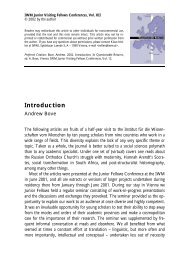
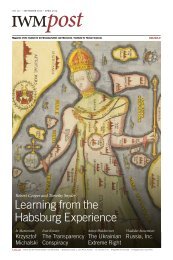
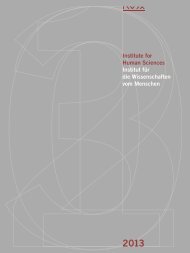
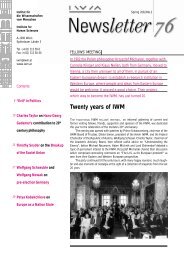
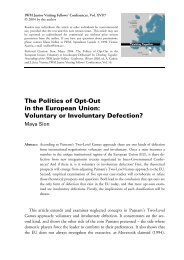
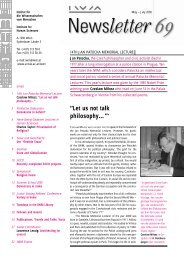
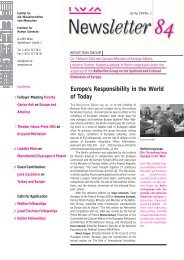
![POSZUKIWAÅ PRAWDY I ZABAWY [PODPIS] PROF ... - IWM](https://img.yumpu.com/23611273/1/184x260/poszukiwaa-prawdy-i-zabawy-podpis-prof-iwm.jpg?quality=85)
